18. WORLD WAR TWO

VICTORY!
CONTENTS
 Preparing for a post-war world Preparing for a post-war world
 Roosevelt suddenly dies (April 12, 1945) Roosevelt suddenly dies (April 12, 1945)
 The
final destruction of Hitler's German The
final destruction of Hitler's German
Reich – April-May 1945
 The war in Europe is finally over The war in Europe is finally over
 Political considerations thrust Political considerations thrust
themselves forward
 The Potsdam Conference – July 1945 The Potsdam Conference – July 1945
 The atomic bomb The atomic bomb
 Peace at last! Peace at last!
 Japan's formal surrender – September 2, Japan's formal surrender – September 2,
1945
The textual material on this webpage is drawn directly from my work
America – The Covenant Nation © 2021, Volume Two, pages 39-52.
A Timeline of Major Events during this period
| 1940s |
Victory!
1945 Roosevelt, Churchill and Stalin meet (Feb) at Yalta (southern Russia) to go over postwar plans; seeing how the
Japanese are so willing to fight, it is expected that it will take
another two years to bring
Japan to defeat; Roosevelt is delighted when Stalin promises to bring
Russia into the war against
Japan after Germany is defeated ... under the provision of Russia
gaining Japanese land
and becoming the "protector" of various Chinese and Korean territories
American troops
now find themselves on Japanese islands (Iwo Jima - Feb / Okinawa -
Apr) ... with the Japanese
seemingly willing to defend their land down to the last man, woman and
child
To America's
huge shock and horror, a very sick Roosevelt suddenly dies (mid-Apr)
... bringing the relatively unknown Truman to the US presidency
Hitler commits
suicide (end of Apr) ... and the German government collapses; the
German military surrenders officially (early May)
Truman, Churchill and Stalin meet at the Berlin suburb of Potsdam (Jul) ... to go over postwar plans; halfway through
the conference, Churchill is informed that he is to be replaced by
Labour Party leader Atlee both as prime minister and as Britain's chief delegate to the Potsdam conference ... a result of British national elections that just took place
Two American
atomic bombs are dropped over Japan's Hiroshima and Nagasaki
(Aug) ... finally breaking the Japanese resolve to fight to the end
Realizing that
the war with Japan is about over, Stalin immediately declares war on
Japan to claim the fruits of the Yalta agreement
Japanese
delegates sign the documents of surrender aboard the US battleship Missouri (Sep); the war is officially over
|
PREPARING
FOR A POST-WAR WORLD |
|
By the beginning of 1945 it was quite clear that
the Nazi Reich was not going to last much longer. With the collapse of
the Reich, much of Europe would find itself without government.
Considering the great extent of the destruction of Europe caused by the
war, it was expected that immense social and political dislocation
would result, threatening the peace that the Allies were striving for.
Roosevelt, Stalin and Churchill understood that an administrative plan
of sorts would have to be laid out to provide some kind of transition
to a stable post-war Europe.
It was not just political necessity that
held this alliance of Russia, America, Great Britain (and other members
of the United Nations) together at this point, but a certain
willingness of Roosevelt to idealize this relationship. Roosevelt had
been born into a world of privilege, raised by an aristocratic mother,
and schooled in the gentlemanly environment of Groton Prep School and
Harvard College, where there was an expectation that life must operate
according to basic rules of civilization. Roosevelt, who was of only
middling intelligence – but massive personal charm – had learned to
trust the world around him, especially the progressive intellectuals
who filled the ranks of his advisory staff, which, central to
Roosevelt's New Deal Program, had attempted to bring rational solutions
to the confusing world of the Great Depression. Roosevelt expected the
surrounding world – which now included Soviet leader Stalin (whom
Roosevelt believed he had won over as a friend by his own enormous
personal charm) – also to operate in this same way. In Roosevelt's long
political career, it was this gentleman's game (plus this personal
charm of Roosevelt's) that had seemingly always moved his world. Now it
was time to bring this noble process to the realm of world diplomacy.
Thus Roosevelt truly believed that the
war had brought Russia and America together in some kind of new
like-mindedness about how the world should take shape after the war. He
and Stalin had this understanding – which is what Roosevelt presumed
had directed the discussions in Tehran about the conduct of the final
stages of the war and the shaping of the upcoming post-war alignment.
In fact, Roosevelt had seemed more
cautious about the political designs of British Prime Minister
Churchill, who harbored deep suspicions about Stalin and the Russians,
and anyway who always talked about saving the British Empire. Roosevelt
had no interest in the British Empire. Likewise, Americans in general
were supposed to be, by some kind of instinct, opposed to all empires
(this was why they supposedly had fought in World War One). Roosevelt
had believed therefore that a special relationship with Russia created
during the war would be more important to America and the world after
the war than America's relationship with imperial Great Britain. Also,
the fact that Churchill distrusted Stalin annoyed Roosevelt greatly,
and he did what he could to keep Churchill at some distance from the
off-stage discussions that he and Stalin were having.
The United Nations Organization
When Roosevelt laid out plans for a new global diplomatic organization, the United Nations Organization1
(a post-war organizational follow-up to the wartime or military United
Nations), to replace the moribund League of Nations, he had provided
for the new U.N.'s direction by what was referred to as the Four
Policemen: America, Soviet Russia, Great Britain and China (eventually
this small group of major powers would include France within its
ranks). He had assumed the natural cooperation of Great Britain and
China with America's leadership. But the real dynamic driving the
organization, he had believed, would be the cooperation between America
and Soviet Russia – clearly the two budding, post-war Superpowers.
The General Assembly.
In a number of ways, the new U.N. he proposed appeared to be much like
the League of Nations that it was replacing. The U.N. General Assembly
would continue the League's idea of the equality of each of the
sovereign members of the organization, the equal respect accorded to
the voice of each member. The General Assembly was intended to be a
large gathering of all members where they could air their thoughts and
concerns freely in an effort to reason together in building a better
world after the war. Each member had an equal vote in building
cooperative international policy. Each member had an equal
responsibility in building the international culture and its political,
economic and social values that would hopefully guide the world to a
much-needed peace.
The Security Council.
Also, similar to the League and its Council, the U.N. would possess a
special branch, the Security Council, which would be set up to deal
with matters that fell beyond the reach of mere reason to resolve:
conflicts which threatened directly the world's peace. Like the League
Council, the new Security Council would rely on the muscle of the
world's major powers – America, Russia, Britain, China (and eventually
France) – to lead the way. The Security Council was to be a small
assembly of just fifteen of the U.N. members, the Big Five serving
permanently on the Security Council (thus the Permanent Members), and
then ten other members chosen from the General Assembly serving on a
rotational basis. Like the older League Council, the Security Council
was envisioned as the enforcer of the post-war international status quo.
But the most important feature of the
Security Council was the absolute veto power given to each of the five
Permanent Members. Any one of the five could effectively block a U.N.
action if it was perceived to be opposed to that country's particular
national interest, the purpose being to prevent the organization from
being drawn into a conflict which would pit it against one of the major
powers, the one thing that most undercut the operations of the League
of Nations – which ultimately led each of the major powers to withdraw,
one by one, from the League.
It was expected (at least by Roosevelt
and the Americans) that this provision would be exercised only very
infrequently, as it was supposed that the spirit of unity that had
these five powers working so closely together during the war would
continue on into the post-war period. This would soon prove to have
been a very naive Rooseveltian assumption.
Bretton Woods (July 1944).
In July of 1944 delegates from forty-four United Nations Allies
gathered at Bretton Woods, New Hampshire, for a three-week conference
to plan for a post-war international economic system. The goal was to
open or free up trade and currency exchange among these partner nations
– so as to facilitate rapid post-war economic recovery. Two
international organizations, the International Bank for Reconstruction
and Development (IBRD) and the International Monetary Fund (IMF) were
set up to facilitate this move toward freer trade and currency
exchange. Indirectly, the American dollar was made the international
standard or base by which their currencies were valued. And this value
could be changed only by agreement with the IMF.
The Soviet Russians participated in the
initial talks at Bretton Woods. But coming to see the IBRD and the IMF
as basically extensions of American capitalism, they ultimately refused
to join those international organizations. This was an early sign of
things to come.
Yalta (February 1945).
With the collapse of the Nazi Reich well underway, it became a matter
of critical importance for the Allied powers to come to some kind of
agreement as to how Europe was to be brought to a new political order.
Thus it was in February of 1945 that
Roosevelt, Stalin, and Churchill gathered for a meeting in southern
Russia at the Black Sea resort of Yalta. What they resolved there as an
answer to these many problems was basically an agreement as to which
parts of Europe were to fall under which military governments. The
lines were drawn pretty much as they expected to find their armies
positioned anyway at war's end. The Russian Red Army would occupy and
administer most of Eastern Europe. Italy would fall largely under
American supervision. And Germany would be divided into a number of
different zones administered by Russia, America and Britain (it was
eventually agreed to give France a section, carved out of the American
and British zones). The German capital, Berlin, would also fall under
joint zoning and administration, even though the city was located
entirely within the Russian zone of occupation.
But understanding that the war in the
Pacific against Japan was far from over, Roosevelt also hoped that with
the final defeat of Germany, Stalin might bring Russia into the war
being waged in Asia against Japan. Up to that point Russia had not been
at war with Japan. As Stalin saw no particular advantage for Russia in
joining in, both Roosevelt and Stalin knew that they would have to
offer Russia some incentives for doing so.
Thus as an incentive for Russia to enter
the war against Japan, it was agreed that Russia would be given title
to the island of Sakhalin off the Pacific coast of Russia and would be
accorded administrative rights at war's end in Korea north of the 38th
parallel and in the Chinese province of Manchuria. Accordingly, Stalin
promised to enter the war against Japan within a short period of time
("two or three months") after the completion of the defeat of Germany.
Roosevelt and Churchill were pleased with this decision because it was
expected that the war against Japan, which was proving to be incredibly
deadly, was likely to last another two years – even with Russian help.
A fast-collapsing Germany
In March of 1945 the Western Allies
(Americans, British, French, etc.) finally crossed the Rhine River and
were heading rapidly eastward across Germany. In the same month the
Russians captured Vienna (Austria). The end was nearing for Hitler's
Third Reich. In April the Russians were now moving rapidly through a
fast collapsing Berlin.
1Actually
Roosevelt had come up with a draft proposal for just such an
organization only a few weeks after America's entry into World War Two
in early December of 1941, and on New Years Day 1942 his proposed
organization was formalized as the United Nations when America, Great
Britain, Soviet Russia and China signed a document soon to be known as
the United Nations Declaration – which then representatives of
twenty-one other nations also signed the very next day.
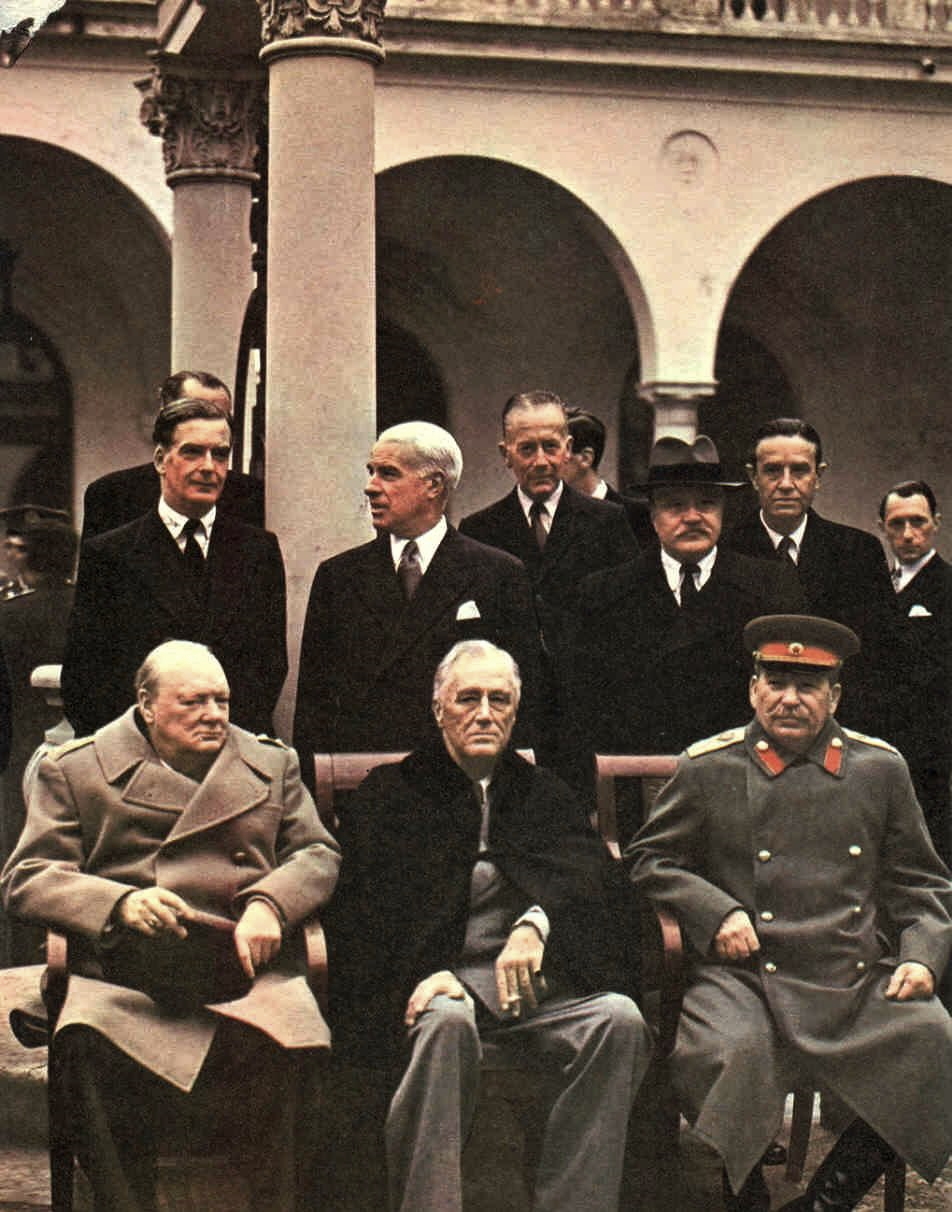
Churchill,
Roosevelt and
Stalin at Yalta – February 1945. Behind them are Sir
Anthony Eden, Edward R. Stettinius, Jr., Sir Alexander Cadogan, Vyacheslav
Molotov and Averell Harriman. Note: Roosevelt is
not in good health; the trip to Yalta greatly drained his strength
Franklin D. Roosevelt
Library
THE "CHANGING OF THE GUARD" AT THE WHITE HOUSE WHEN ROOSEVELT SUDDENLY DIES (APRIL 12, 1945) |
|
Meanwhile, Roosevelt had become a very sick man.
It was apparent in the grayness of his complexion at the Yalta meeting.
But mostly Americans chose to not take notice of the failing health of
their leader.
Then – to the great horror of the
American people – Roosevelt suddenly died (April 12, 1945) while on a
trip to Georgia to take advantage of the healing waters of his Warm
Springs spa.
|

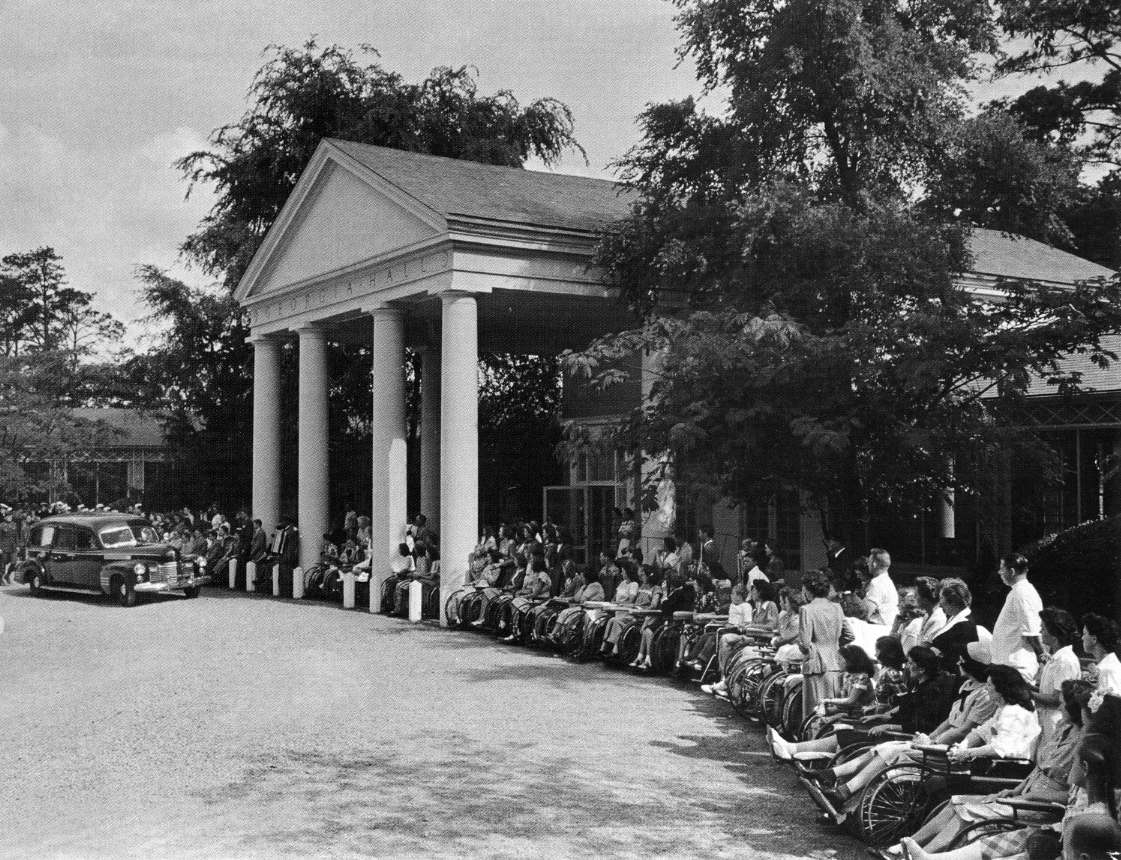 Polio patients at
Warm Springs
Georgia spa honoring the dead president FDR
Polio patients at
Warm Springs
Georgia spa honoring the dead president FDR
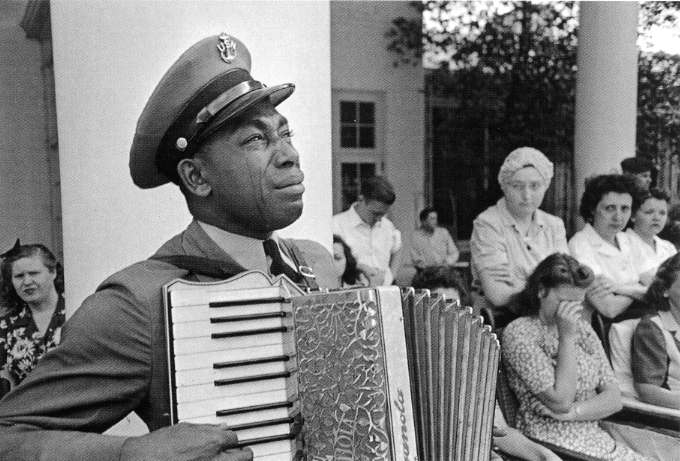 Accordionist Graham Jackson
paying tribute to FDR at Warm Springs
Accordionist Graham Jackson
paying tribute to FDR at Warm Springs
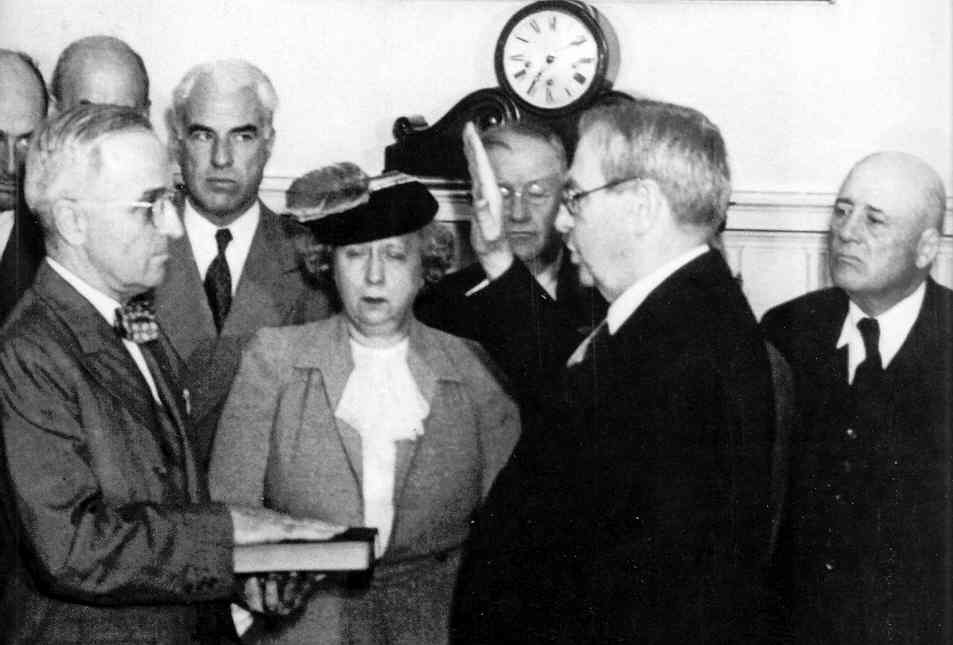
Harry S. Truman
sworn in
as 33rd President by US Supreme Court Chief Justice Harlan Stone – April
12, 1945
Harry S. Truman
Library
|
Harry Truman – U.S. President
Americans were shocked. Not only to their great
surprise they had lost their beloved commander-in-chief while the war
was still underway, but they were now being led by the former vice
president, Harry S. Truman, a politician largely unknown to most
Americans. By all appearances this new president that fate had suddenly
thrust on the American people came across as something like the guy
next door – ordinary and most unexceptional. He was not the great
charmer – to the grand disappointment of the American populace, who had
been greatly charmed by Roosevelt.
But it was this lack of outward polish
that made Truman in fact a highly talented political leader. Unable to
charm his way through life, Truman was someone who had to put forth
great personal devotion and hard work – and at times personal bravery –
to get things to move his way.
|
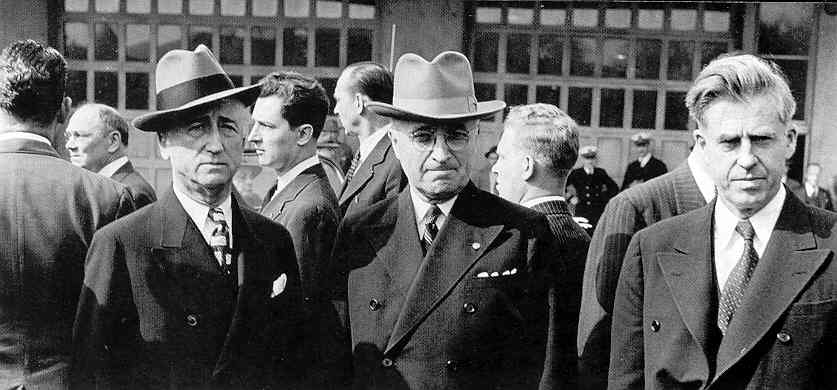 James Byrnes, the
new President,
Harry Truman, and Henry Wallace awaiting FDR's funeral train –
1945
James Byrnes, the
new President,
Harry Truman, and Henry Wallace awaiting FDR's funeral train –
1945
The Harry S. Truman
Library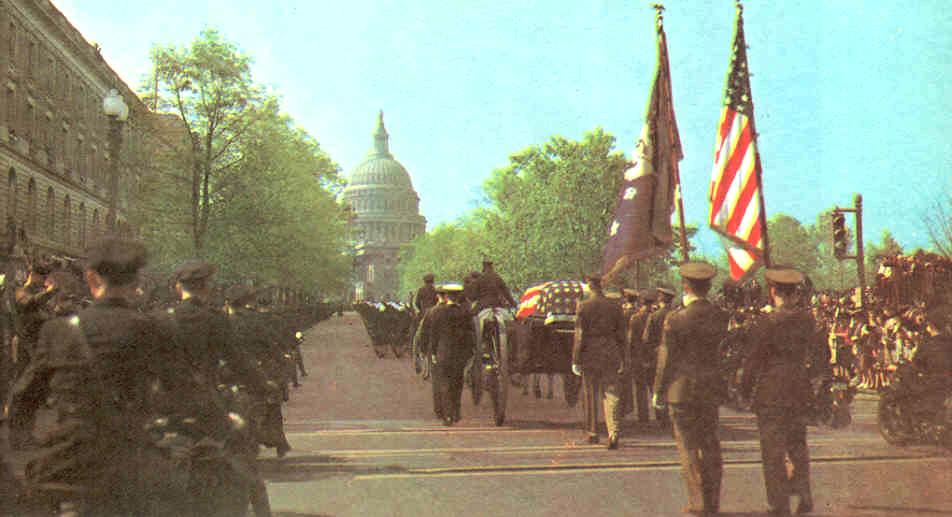
FDR's funeral
cortege passes
through Washington, D.C. on its way to Hyde Park, New York – April
1945
Harry Truman – the man
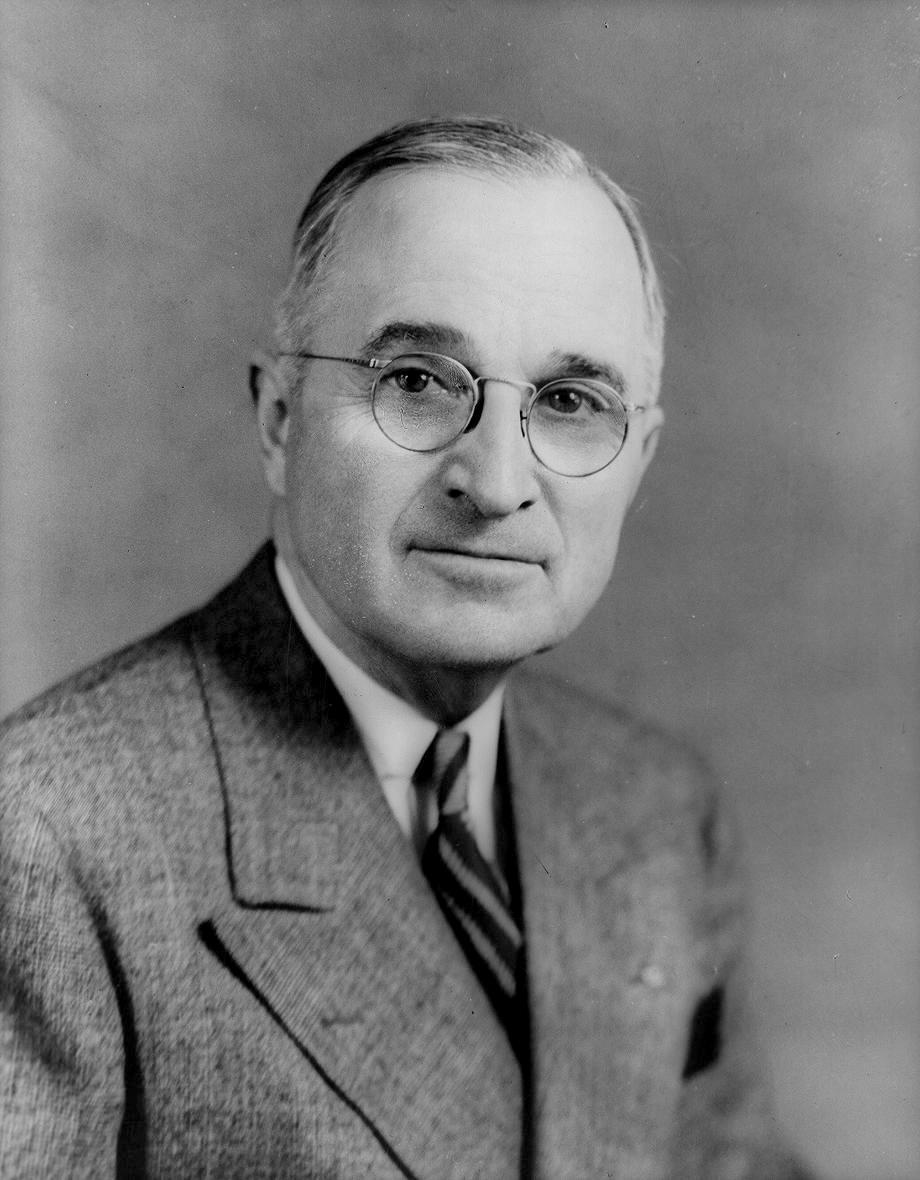
Harry Truman –
1945
Library of
Congress
|
Born in 1884, Truman had been raised on a 600-acre
farm in Missouri to a father who was active in local Democratic Party
politics and a mother who encouraged in him an early interest in music
(the piano) and reading (though he did not undertake formal schooling
until he was eight). After graduating from high school in 1901 he
briefly (one year) attended a business school in Kansas City and then
took a series of jobs as a clerk, before returning to the family farm.
He had wanted to attend the U.S. Military Academy at West Point, but
had been rejected because of his poor eyesight. Thus he joined the
Missouri National Guard in 1905, attaining the rank of corporal in an
artillery battery (he was able to enter the National Guard by first
memorizing the eye chart!).
He dropped out of the National Guard in
1911, but rejoined the unit when America entered World War One in 1917
– helping to sign up other young men to his unit. Popular with the men,
they elected him as their 1st lieutenant. At training camp, he worked
with both Edward Jacobson, who would become a business partner after
the war, and Tom Pendergast, son of Kansas City Democratic Party
political boss Pendergast – a connection that would eventually bring
Truman into the world of politics.
In France Truman was promoted to captain,
and given command of an unruly artillery battery, which he disciplined
– to the strong opposition of the men, at first. He ultimately proved
to be an excellent leader, and also an independent thinker, who
disobeyed orders and had his men destroy a German artillery battery –
thereby saving an American division that would have come under the
heavy fire of the German battery. His discipline and leadership
resulted in the loss of not a single man in his unit, and their eternal
love and support of Truman (which would later factor into his political
rise from obscurity). After the war Truman would continue to serve in
the Reserves, rising to major (1920), lieutenant colonel (1925) and
colonel (1932).
Also after the war, Truman joined up with
Edward Jacobson to open up a men’s clothing store (haberdashery) in
Kansas City, giving Truman enough financial leverage to finally marry
Bess Wallace. But the store failed in the post-war recession of 1921.2
However his relationship with Tom Pendergast led Truman to be supported
in his run for office as a county judge (actually more like a county
commissioner, as it was an administrative rather than a judicial job).
In 1923 he took up the study of law (night school) hoping to eventually
become a lawyer. But even Pendergast’s Democratic Party support could
not prevent Truman from losing his office in the 1924 Republican Party
electoral sweep across the nation, and he took up another clerical job
and dropped his law studies (1925). Then in 1926 he was returned to
office (again with Pendergast support) as the county’s presiding judge,
but did not resume law studies. He would be re-elected to the office in
1930.
At this point Truman’s hard work and
self-discipline registered itself in the modernization of Kansas City
(numerous public works projects), in which Truman played a key role.
Then with the onset of the Great Depression, Kansas City Boss Tom
Pendergast (Pendergast’s father, who was personally very impressed with
Truman’s strong performance) had Truman appointed by Roosevelt as
Missouri director of one of the president’s New Deal programs,
initiating a personal connection between Truman and Roosevelt’s special
advisor, Harry Hopkins.
After much back and forth maneuvering,
Pendergast finally decided to support Truman as the Democratic Party
candidate in the 1934 race for U.S. Senate. With the nation's
continuing blame of the Republican Party for the Great Depression,
Truman scored a huge margin of victory over his Republican rival and
entered the U.S. Senate in 1935, with the accompanying label as "the
senator from Pendergast." Living down the reputation as being nothing
more than the tool of a notorious urban boss would not be an easy
challenge to rise above. But Truman would eventually prove himself to
be a man of unshakeable integrity. At the same time, he would also be a
through-and-through New Deal Democrat, voicing the standard litany
against Wall Street and the greedy corporate world. However, being a
freshman senator, it would be a long while before Roosevelt would take
any particular note of him.
In 1940, Truman was on his own in facing
reelection (Boss Pendergast had been imprisoned for income tax
evasion), being opposed in the Democratic Primary by Missouri's former
governor and by a well-known U.S. Attorney. But the two opponents split
the vote of the group opposing Truman and Truman received the
Democratic Party nomination, and a narrow victory over his Republican
opponent in the November 1940 elections.
Meanwhile, Truman's hostility to corporate waste had him in late
1940 create and chair a subcommittee of the Senate Committee on Military
Affairs investigating U.S. army bases. Then with America's entry into
World War Two a year later, the work of his Truman Committee would soon
draw national notice. His committee not only eventually saved the U.S.
government from as much as $15 billion in waste but also drew the
attention of Time Magazine which featured him on its March 1943 cover
(the first of many).
Thus it was that Truman's name came up
when in 1944 Roosevelt began considering his run for a fourth term as
U.S. president. Henry Wallace had been serving as Roosevelt's vice
president. But Wallace's virtually Socialist ideals were putting off
Democratic Party leaders. Close involvement with Russia was raising
many questions about how America wanted to shape its post-war economy.
Socialism was coming to be identified with government tyranny, on the
Stalinist model. Meanwhile capitalism had cleared itself with its
enormous output of industrial goods during the war. Thus the country
was swinging against the Socialist tendencies of New Deal programming
and more to the hope of a post-war capitalist revival (though certainly
not an idea that would go unchallenged). Wallace was thus increasingly
problematic as vice president. And so it was that Roosevelt and his
advisors turned to Truman as a compromise candidate. And with the
Democratic Party's 432–99 win over the Republican Party in the 1944
election, Truman became America's vice president. And thus it was also
that Truman soon became the new U.S. president.
Personally, Truman was himself shocked
that, with Roosevelt's death only a few months into the new
presidential term, such a heavy post-Rooseveltian legacy had suddenly
fallen on his shoulders. He was fully aware of the heavy
responsibilities of the presidential office, especially during this
time of war, and was unsure of the level of support he would receive in
having to fulfill those responsibilities. But he was one who had
learned to accomplish much, especially when so little was expected of
him.
In that same month that the presidency
fell on his shoulders Truman went before Congress and prayed a prayer
that certainly also the nation was praying at that time:
As I have assumed my heavy duties, I humbly pray Almighty God, in the words
of King Solomon: "Give therefore thy servant an understanding heart to
judge thy people, that I may discern between good and bad; for who is
able to judge this thy so great a people?" I ask only to be a good and
faithful servant of my Lord and my people.
Indeed, Truman would attempt to live up to that enormous
responsibility. But actually, few thought at the time that this new and
unsought president would be able to meet those standards. In fact
Truman would have a hard time winning the hearts of the American
people, who had become used to the rather majestic presence of
Roosevelt at the helm. Getting the Americans to see in Truman little
more than the qualities of a next-door neighbor or somebody's uncle
would take longer than the time he was actually in office. It would
really not be until a generation later that Americans could look back
and see that Truman at the helm – rather than Roosevelt, at a time when
hard-nosed common sense and not just presidential majesty was required
in the mounting conflict with Soviet Russia – was itself an act of the
same Almighty God that Truman had appealed to in that prayer.
Despite his common ways (often even
profane in language) Truman personally was a man of great personal
faith in God and Christ, a man of daily prayer, and highly Biblical in
the way he analyzed, categorized and chose critical decisions that fell
to him to make. Most of this was of a very private nature, but highly
important to the nation that he would have to guide through the
political, economic, social and spiritual minefields that awaited
America and the world after the collapse of the German and Japanese
empires.
2Certainly
this grand disappointment would impact his thinking, when as president
in yet another post-war period (post World War Two beginning with his
first year in office in 1945) he was given the responsibility of
ensuring that there would be no repeat of such a ruinous post-war
recession, not only in America but eventually even in Europe (where it
had already set in). He worked very hard as president to do what he
could to ensure that others should not have to experience the pain and
humiliation he endured in the early 1920s.
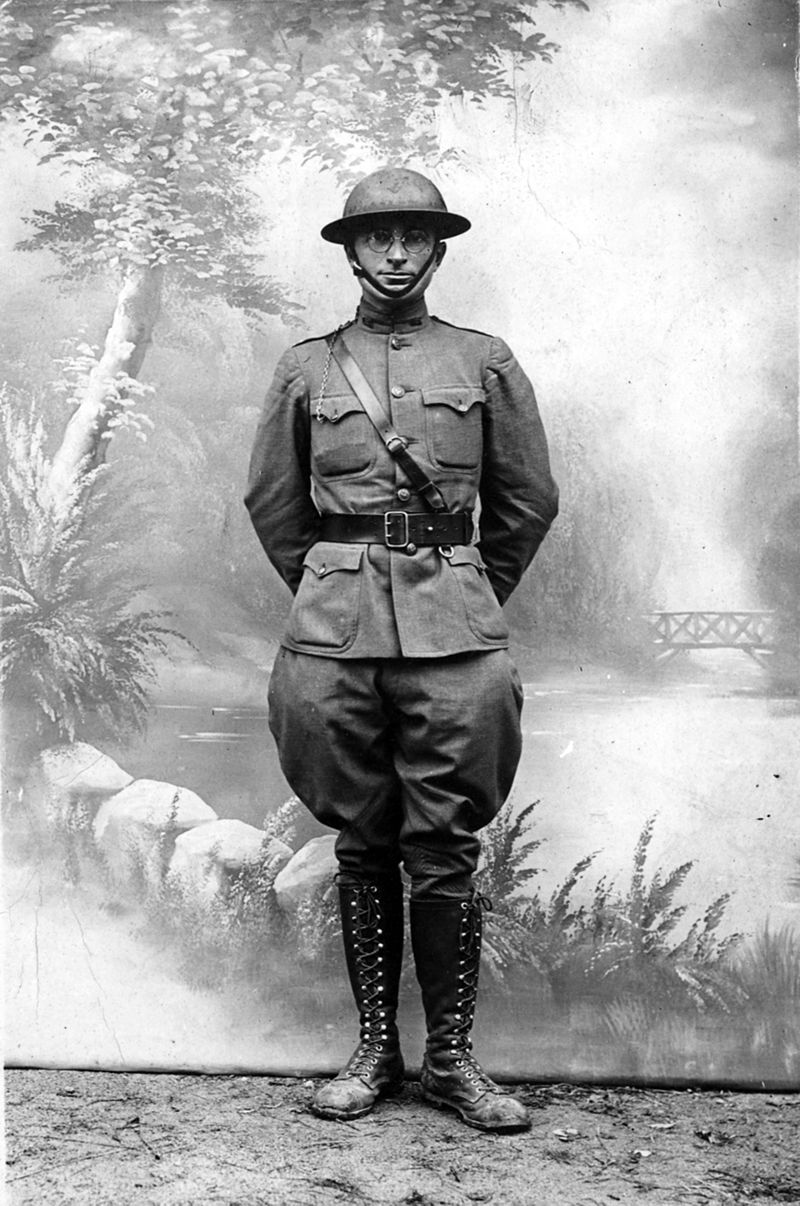
Captain Harry Truman
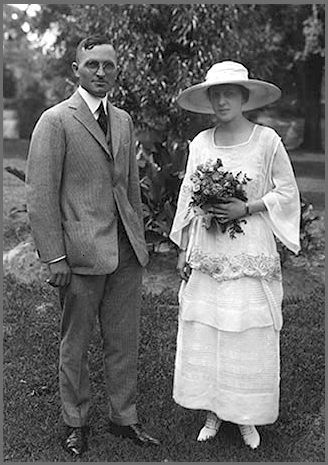
Marrying Bess
Wallace
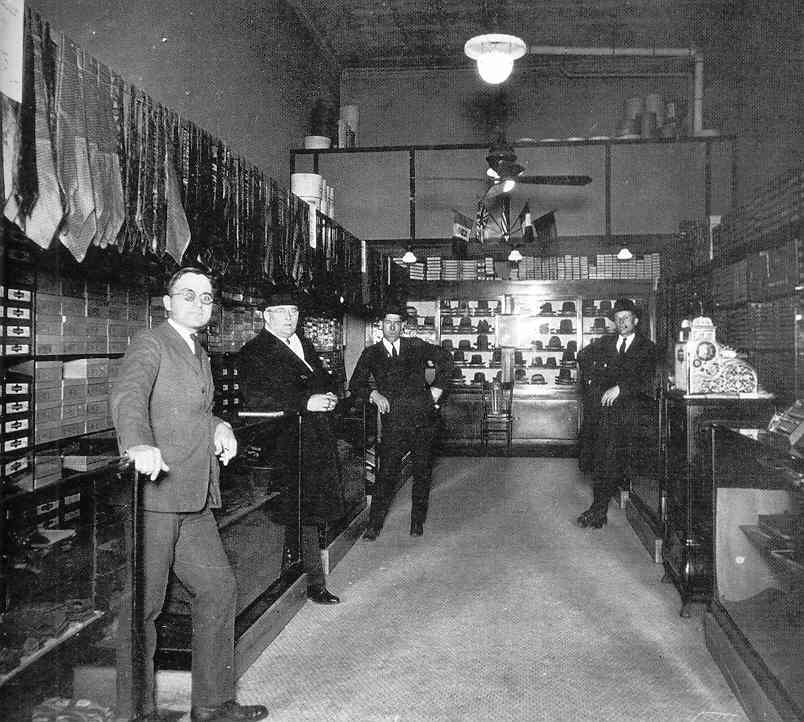
Harry S. Truman
(left) in
haberdasher shop he co-owned with Edward Jacobson (not
shown) in Kansas City -
1919-1922
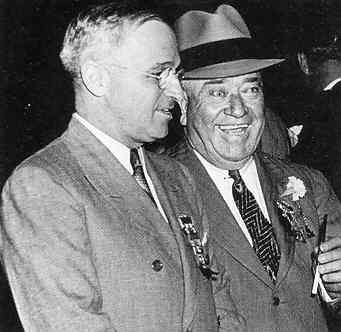 Harry S. Truman and
Kansas
City boss Tom Pendergast – who brought him into politics in
1922
Harry S. Truman and
Kansas
City boss Tom Pendergast – who brought him into politics in
1922
THE FINAL DESTRUCTION OF HITLER'S GERMAN REICH – APRIL–MAY 1945 |
|
Germany surrenders (early May 1945)
With the announcement of Roosevelt's death, Hitler
(whose mind was deeply addled by the huge amount of drugs his doctor
was administering to him on a daily basis) speculated that this was an
act of God pointing to a shift in the fortunes of war in favor of the
Germans. It was not. Berlin was nearly completely occupied by Russian
troops when on the 25th of April the Allies coming in from the West
finally linked up with the Russians coming from the East. Germany was
thus fully occupied by its enemies – at least in the north and central
parts of the country.
Hitler, finally realizing that the end
of his grand German dream was near and taking refuge in a deep bunker
inside Berlin, decided finally to marry his longtime mistress, and then
join each other in the act of suicide (April 30th).
With Hitler dead, the war was, for all
practical purposes, over in Europe. In Reims (France) the German High
Command signed a complete surrender on May 7th, and the next day the
surrender was confirmed in a similar ceremony in Berlin. Within a few
more days the surrender was fully conformed to by all German troops.
The war was finally and formally over in Europe.
|
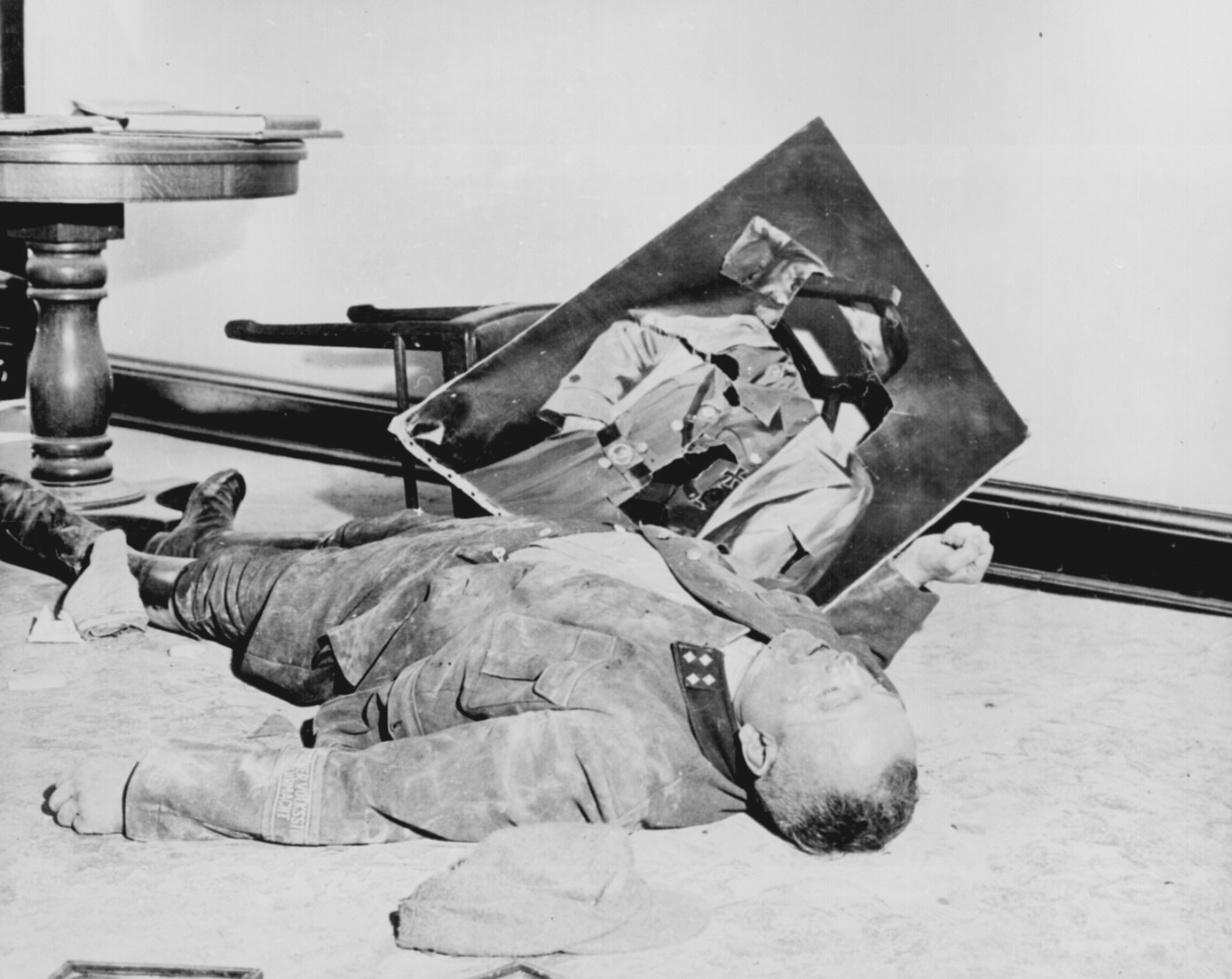
"With torn picture of his fuehrer beside
his clenched fist, a dead general of the Volkssturm lies on the floor of city hall, Leipzig,
Germany. He committed suicide rather than face U.S. Army troops who captured the city
on April 19. 1945." T5c. J. M. Heslop.
National Archives
208-YE-148
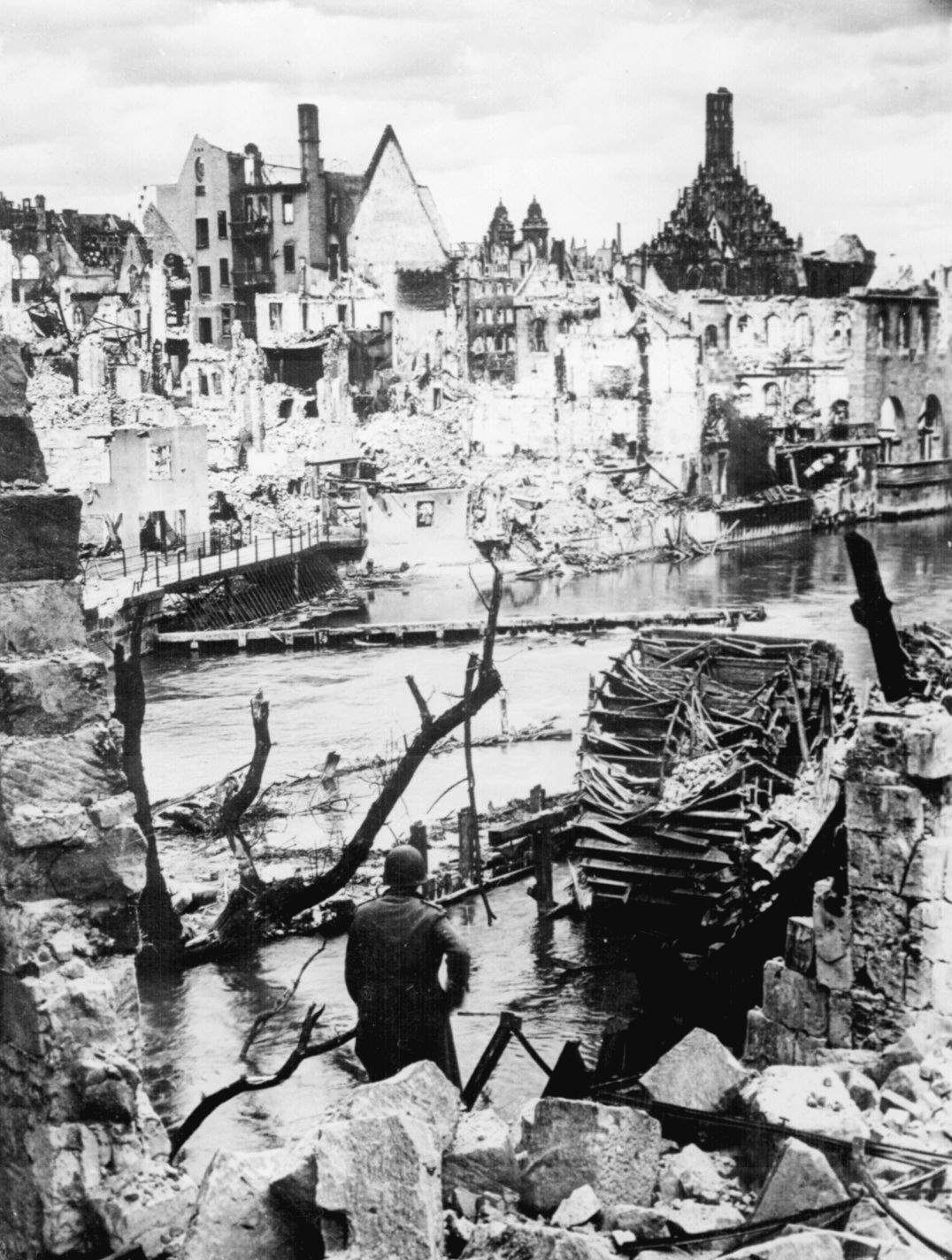
"Choked with debris, a bombed water
intake of the Pegnitz River no longer supplies war in Nuremberg, vital Reich industrial
city and festival center of the Nazi party, which was captured April 20, 1945, by troops of the U.S.
Army."
National Archives 208-AA-
207L-1
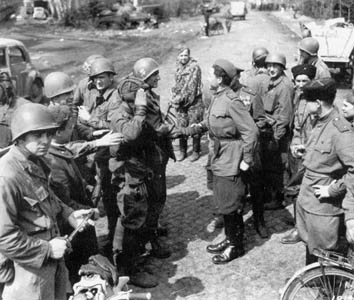
American and
Soviet troops
meet east of the Elbe River – April 1945
U.S.
Army
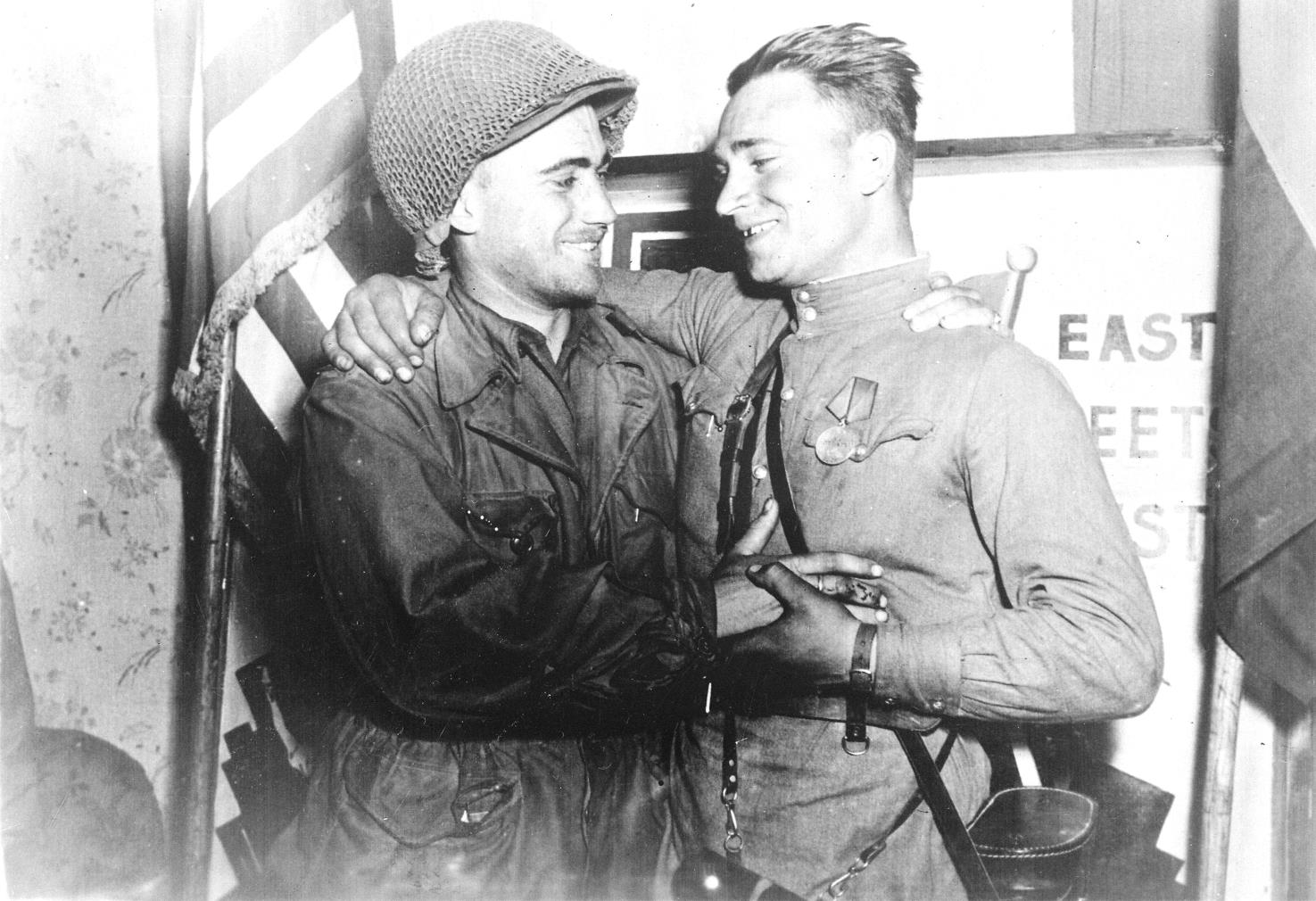
"Happy 2nd Lt. William Robertson and
Lt. Alexander Sylvashko, Russian Army, shown in front of sign ['East Meets West'] symbolizing the historic
meeting of the Russian and American Armies, near Torgau, Germany." Pfc. William
E. Poulson, April 25, 1945.
National Archives
111-SC-205228
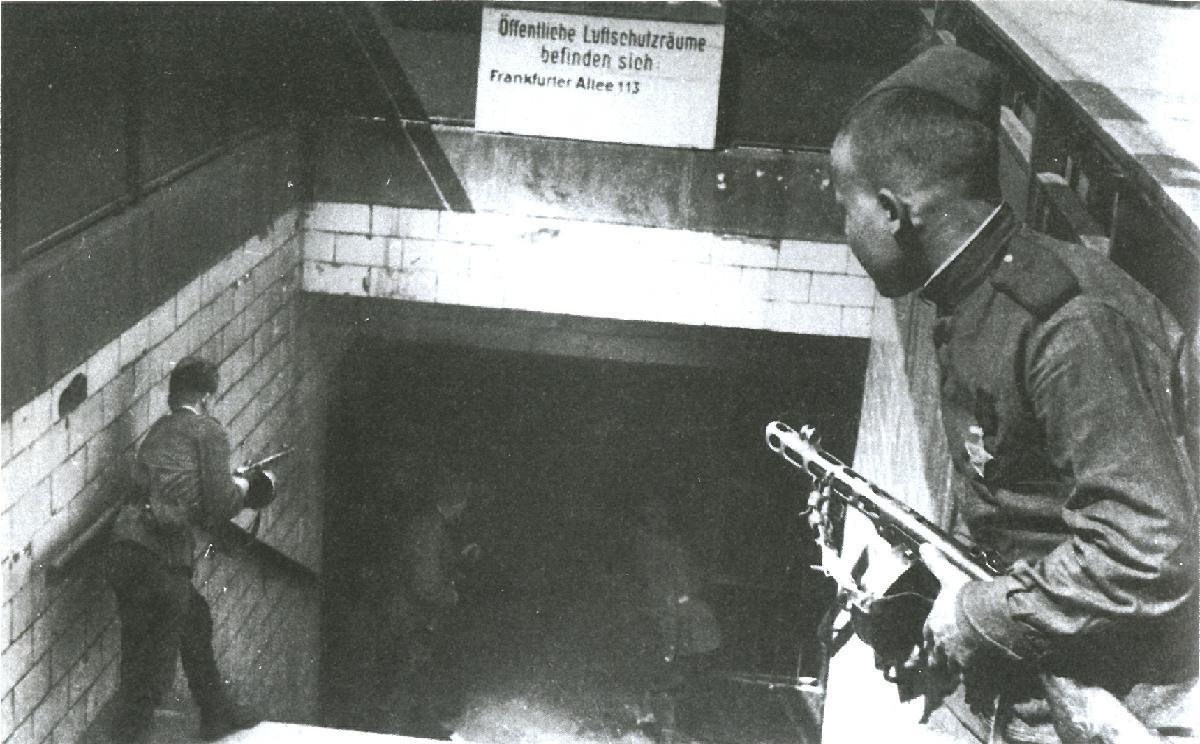
Soviet soldiers
entering
the Frankfurter Allee station in Berlin – 1945
Russian State Archive
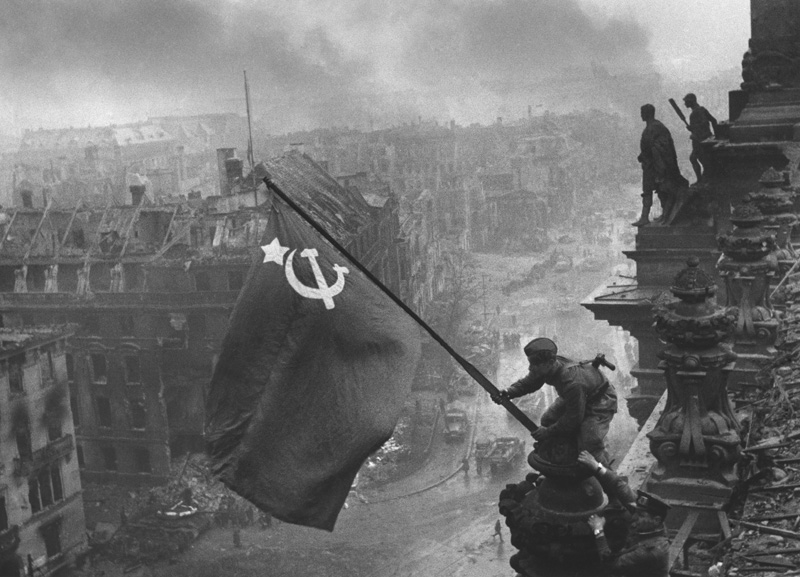
Soviet troops
raising the
Soviet flag over the Bundestag in Berlin – May 1945
Yevgeny Khaldei – Russian
State Archive
THE WAR IN EUROPE IS FINALLY OVER |
The
Germans surrender (May 7, 1945)
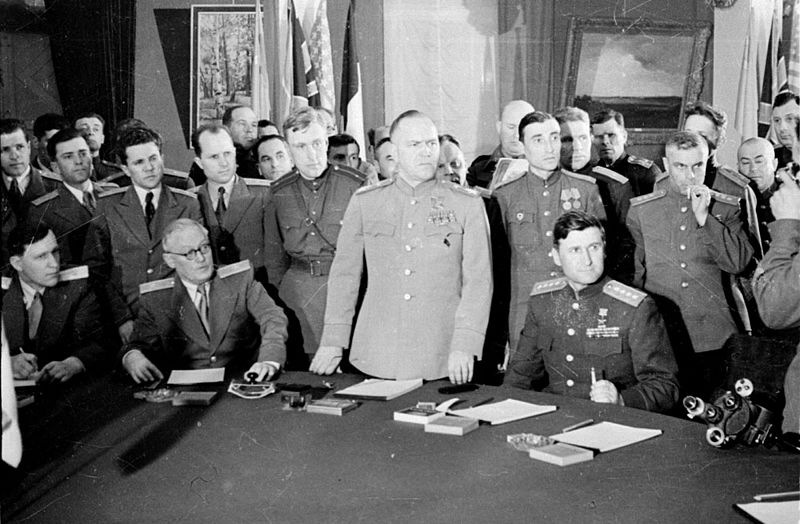
Soviet General
Zhukov at
the signing of the German surrender at Russian Headquarters in
Berlin
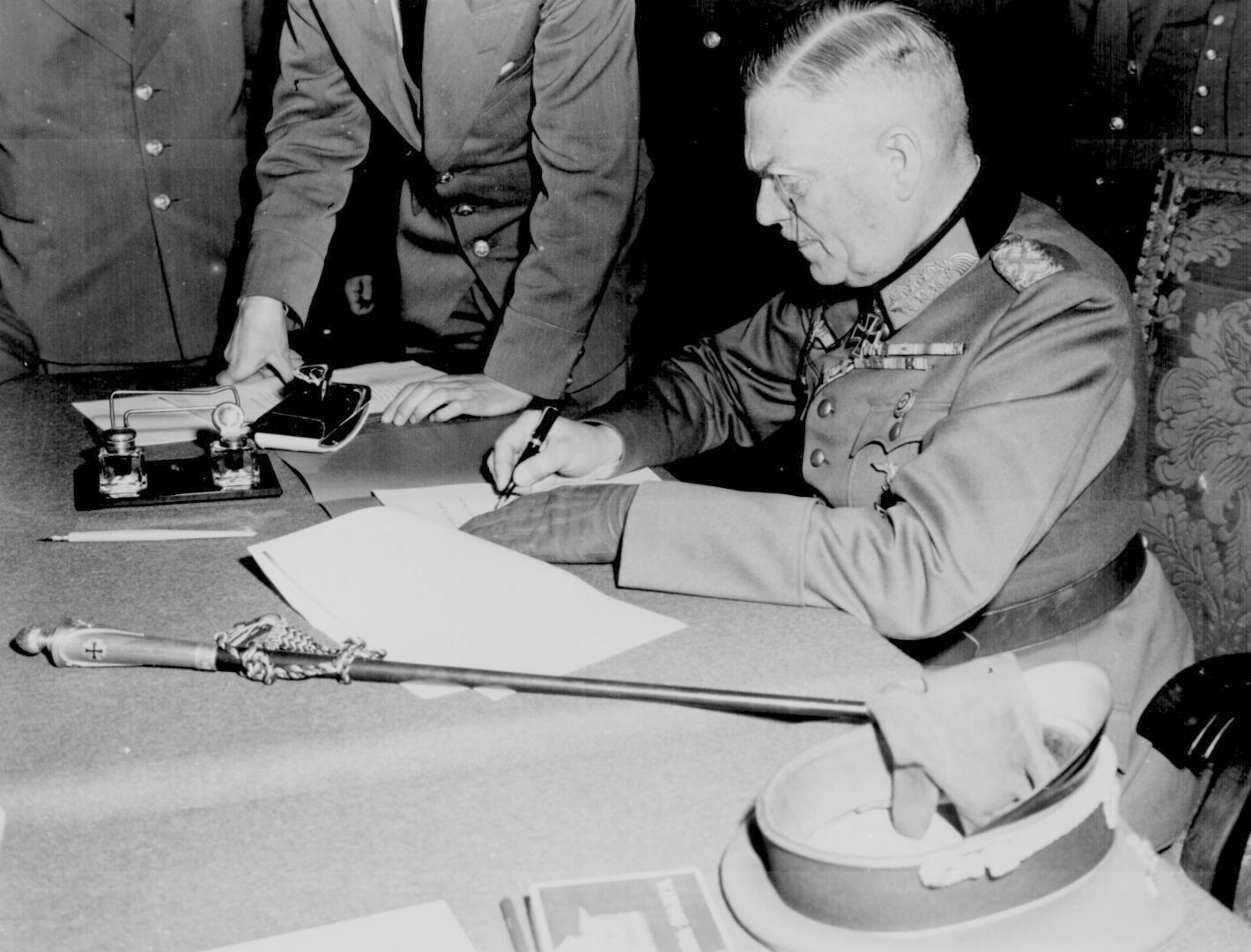
"Field Marshal Wilhelm Keitel, signing
the ratified surrender terms for the German Army at Russian Headquarters in Berlin."
Lt. Moore, Germany, May 7, 1945.
National Archives
111-SC-206292.
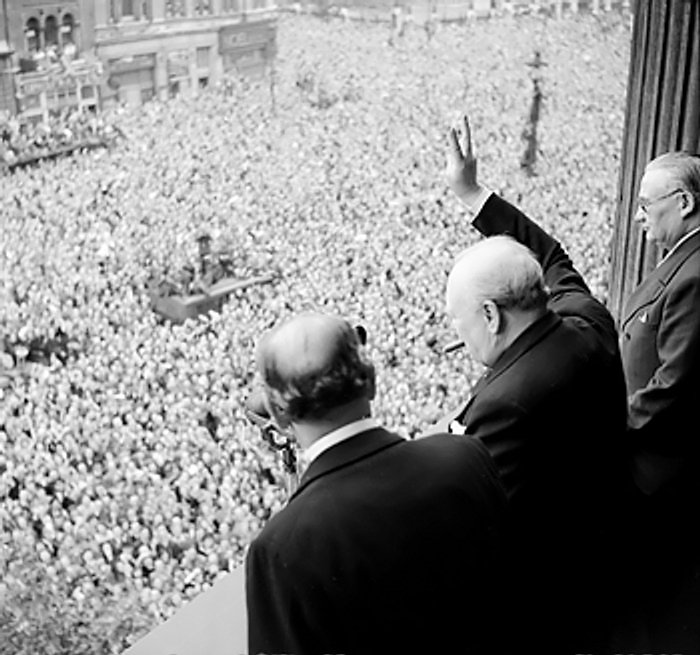
Churchill waves
to crowds
in Whitehall on the day he broadcast to the nation that the war with Germany
had been won, 8 May 1945
Imperial War Museum Photo
No.: H 41849
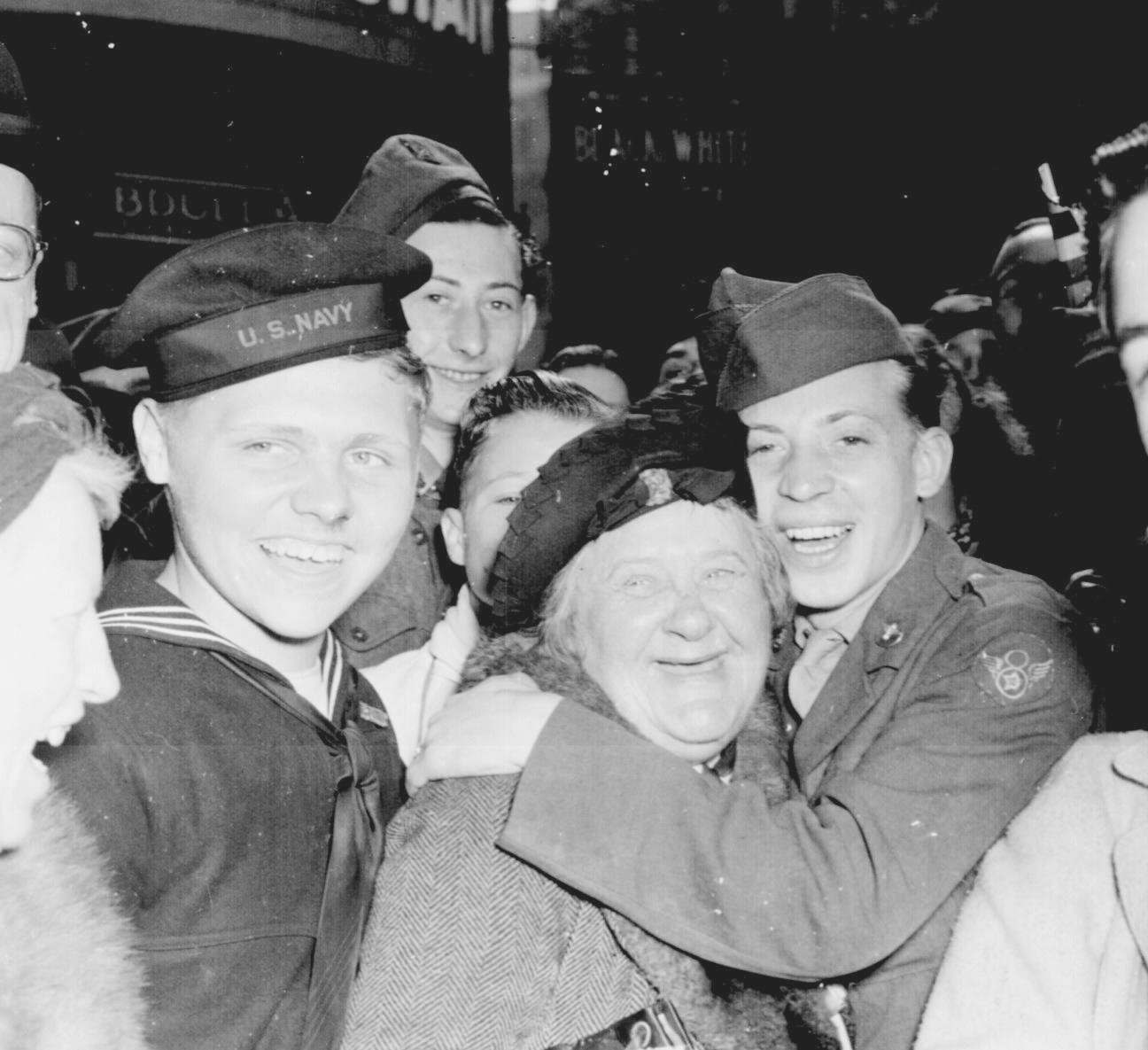
"Jubilant American soldier hugs motherly
English woman and victory smiles light the faces of happy service men and civilians
at Piccadilly Circus, London, celebrating Germany's unconditional
surrender." Pfc. Melvin Weiss, England, May 7, 1945.
National Archives
111-SC-205398
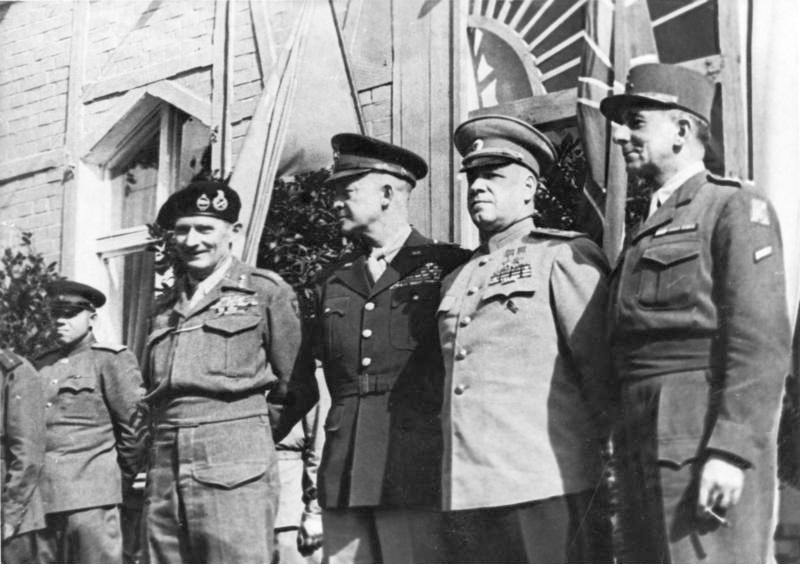
The Supreme
Commanders on
June 5, 1945 in Berlin: Bernard Montgomery, Dwight D. Eisenhower,
Georgy
Zhukov and Jean de Lattre de Tassigny.
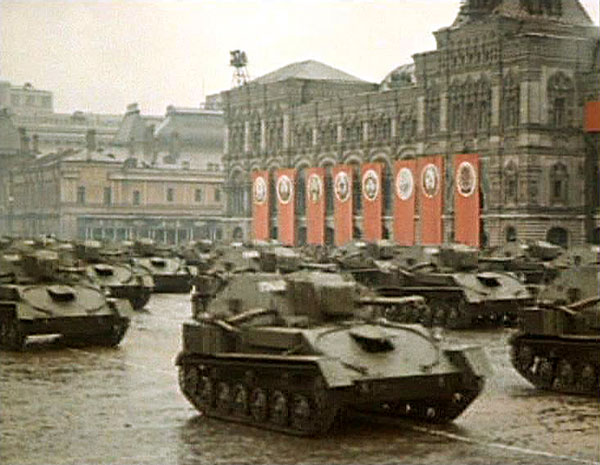 Victory Parade
on Red Square,
Moscow on June 24, 1945.
Victory Parade
on Red Square,
Moscow on June 24, 1945.
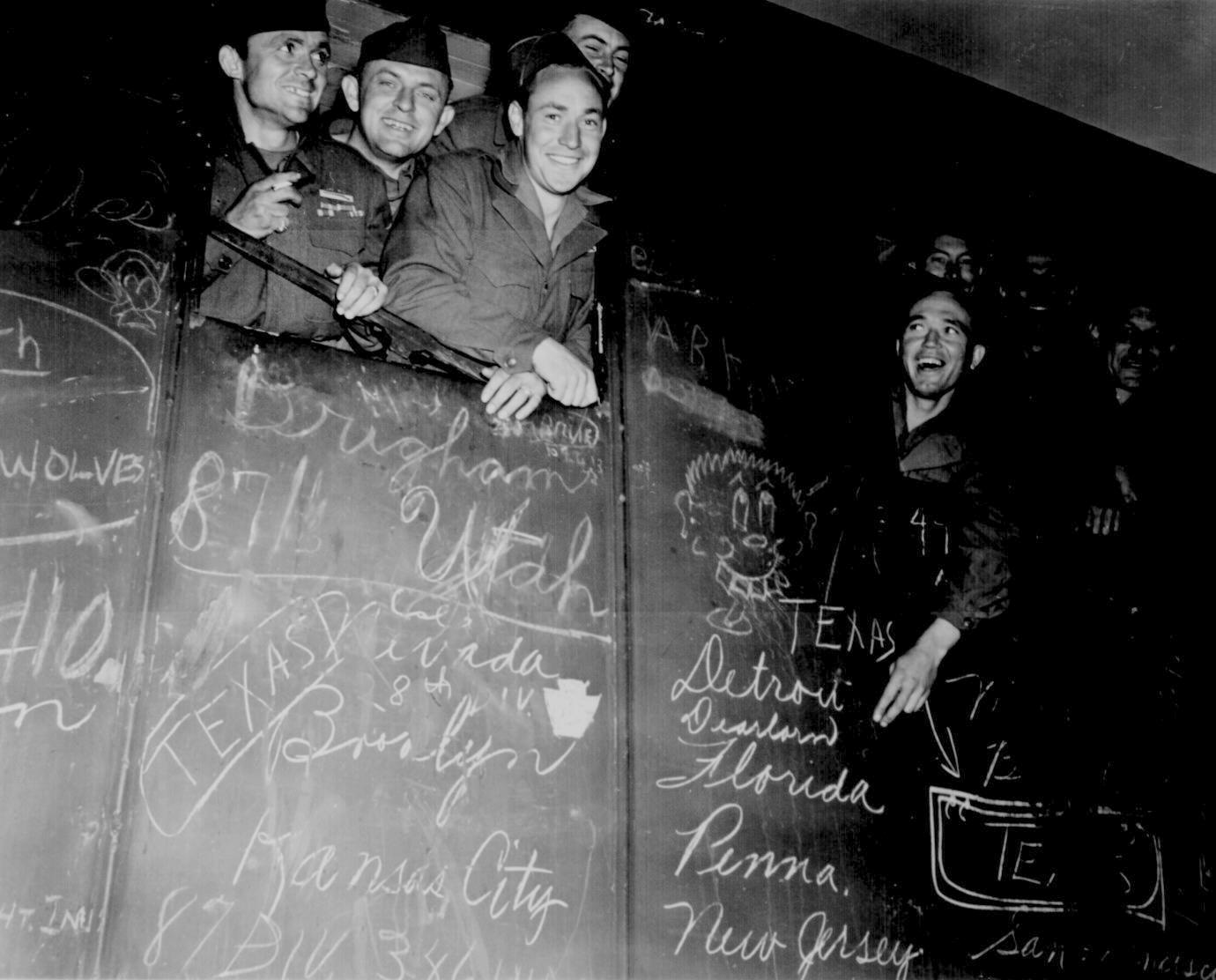
"Happy veterans head for harbor of Le
Havre, France, the first to be sent home and discharged under the Army's new
point system." Pfc. Stedman, May 25, 1945.
National Archives
111-SC-207868.
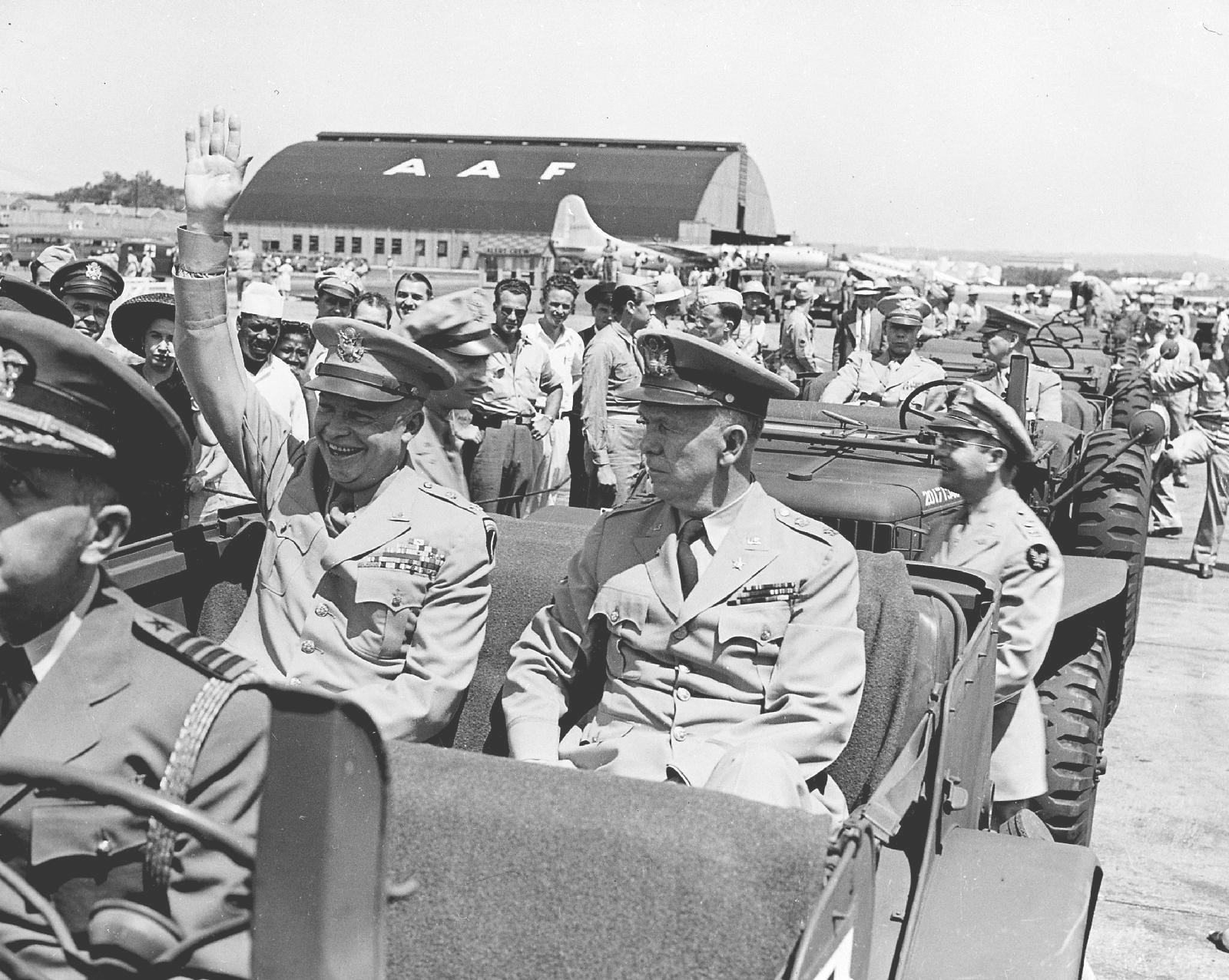
Gen. Eisenhower on his return to Washington
received by Gen. Marshall – 18 June 1945
National Archives – ARC
199108
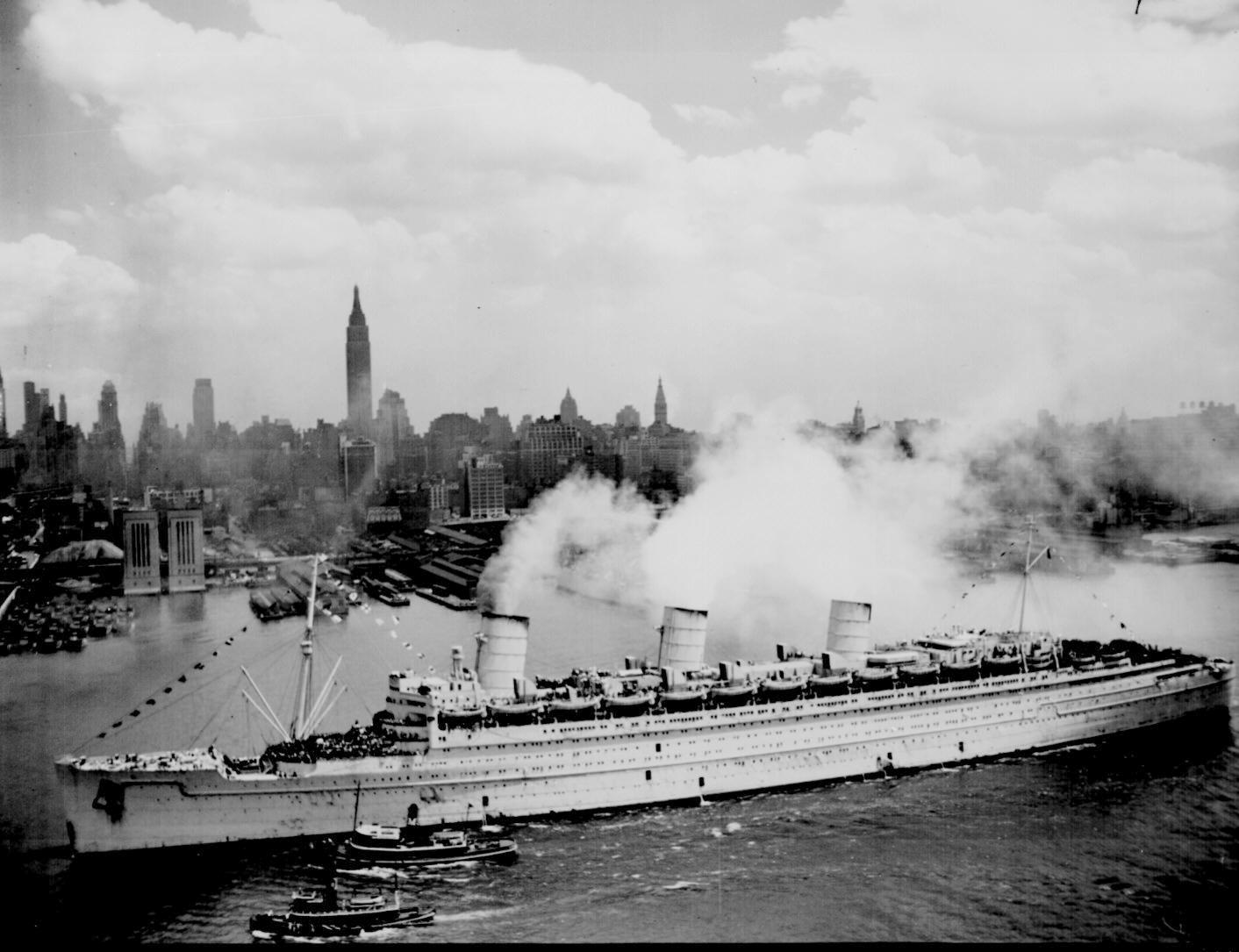
"The famous British liner, QUEEN MARY,
arrives in New York Harbor, June 20, 1945, with thousands of U.S. troops from
European battles."
National Archives
80-GK-5645.
Discovering vast amounts of German
plunder
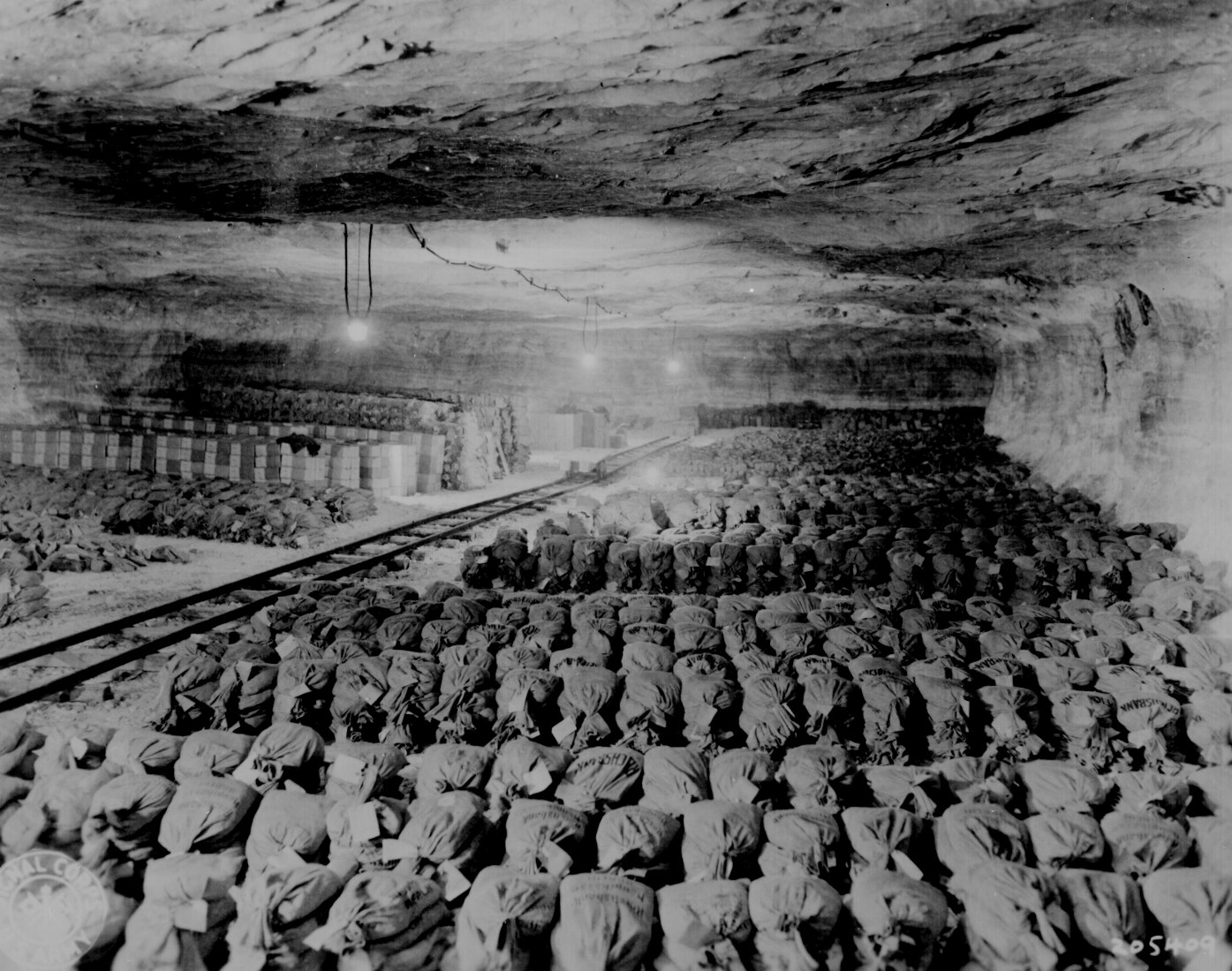
The Reichbank's reserves in a cavern
National Archives
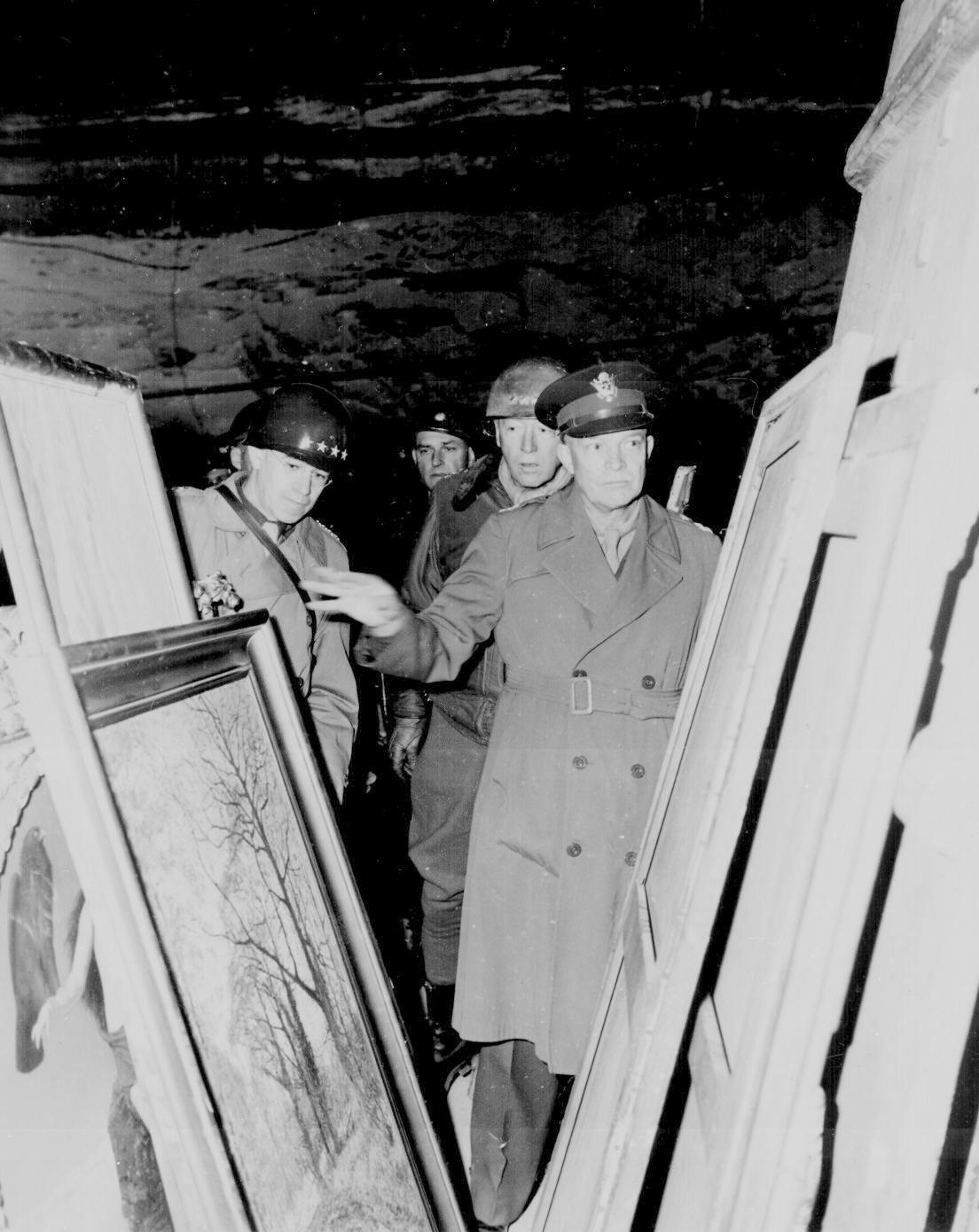
Eisenhower and Bradley inspecting stolen
art
National
Archives
POLITICAL CONSIDERATIONS THRUST THEMSELVES
FORWARD |
|
Truman faced with immediate challenges
Truman had two major problems immediately facing
him as he took command of the American war effort. One of the big
questions was thus one of how the Allies were to take full
responsibility for running a crushed German society ... and the other
societies that had been under Nazi domination for the previous five,
six or seven years. With the collapse of Hitler's Empire there was
nothing directing the social order in these various societies, and the
chaos would therefore be monumental in size. The Allied armies were all
the organization that existed to stabilize post-war continental Europe.
But they were trained and equipped to fight, not to govern. Nonetheless
political responsibilities would follow a military map, and not
necessarily the political directions set out at Yalta.
Secondly there was the matter of the
unfinished business with Japan. This matter of a war with Japan
dragging on likely another two years was a depressing cloud hanging
over any celebration of this victory in Europe. At this point it was
expected that this might take many, many months – even years – to
accomplish, given the way the Japanese were indicating that every man,
woman and child would rather fight to the death than face the
humiliation of surrender. The constant heavy firebombing of Japan by
the American B-29 Superfortress bombers (which had turned the Japanese
capital city Tokyo and other Japanese cities into burning heaps of
rubble and charred flesh) seemed to have no effect in bringing the
Japanese closer to surrender. Apparently, the Allies were going to have
to go through Japan village by village, city by city, killing (and
being killed) in mass numbers every step along the way. From all
appearances in mid-1945, the deadly road to victory over Japan was
going to take a long time to travel.
Also there was this matter of the
political relationship among the victorious powers themselves. No
longer sharing the common goal in destroying the Third Reich, the new
goal of peace would lack entirely that same sense of unified purpose.
Quite to the contrary.
Truman, like most all Americans, was
hoping to see the best of the possibilities of peace, including an
ongoing working relationship with Stalin. But Truman also had a tough
background in Kansas City boss politics and in the U.S. Senate as head
of a committee investigating war-time graft and corruption in the
business of supplying the U.S. government with war goods. This served
to make him very perceptive of subtle power plays going on behind the
scenes. He would quickly come to the awareness that Stalin had
inflexible ambitions for post-war Europe, and that there was little
that could be done about the situation in Eastern Europe – as long as
Stalin's Red Army found itself in military, and thus political and
economic, control of that part of Europe. But he was an obstinate
Missouri mule in his determination that Stalin would never be allowed
to have any influence beyond what his military was able to rule
directly.
Also, here is a key case where Truman's Christian faith informed him
strongly on the position he was to take, in the face of this Stalinist
challenge. Truman was keenly aware of the fact that Soviet Communism
was highly atheistic, and was highly desirous of spreading its
atheistic domination over the world. And Truman would allow himself to
be a party to none of that, at least to the extent that he had some
serious power to bring to the contest. He was always loud and long in
his tough stand against Godless Communism. It annoyed the intellectuals
that he could be so brutally frank about where he stood on this
sensitive matter. But Truman never apologized about being brutally
frank about anything!
Another immediate challenge for Truman on
this post-war Europe matter would be the American people themselves,
who had been fed years of Rooseveltian perspective on Stalin as "Uncle
Joe," our nice-guy ally in Russia. Besides, there were a number of
Republican Party senators on Capitol Hill of the mind that once the war
with Germany and Japan was won, Americans could go home and leave
Europe and Asia in peace to rebuild on their own. This was an extremely
naive understanding of the political situation, but an understanding
which most Americans were quite content to hold.
THE POTSDAM CONFERENCE BETWEEN CHURCHILL (AND ATLEE), TRUMAN AND STALIN – JULY 1945 |
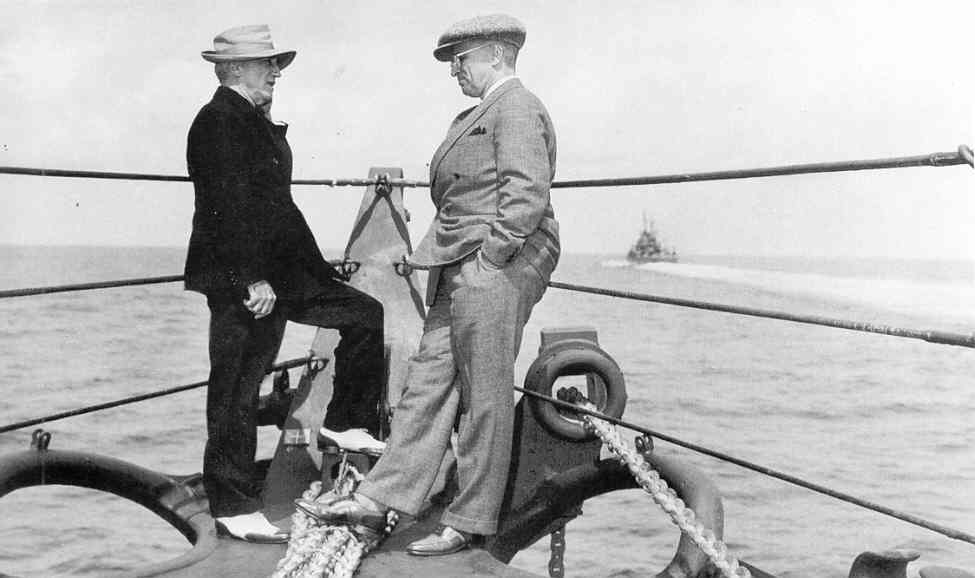
Harry S. Truman
with trusted
advisor Jimmy Byrnes, new Secretary of State – July
1945
The Harry S. Truman
Library
|
The Potsdam Conference (17 July–2 August 1945)
In any case, the summer after Germany's surrender,
Truman, Churchill, and Stalin gathered in the Berlin suburb of Potsdam
in mid-July to iron out further details of governing a post-war Europe,
and of fighting an on-going war with Japan. Truman took up an immediate
liking of (the long-winded) Churchill, as well as Stalin – the latter
at least initially.3 But
the two weeks of the conference would reveal to Truman the dangers of
dealing with Stalin. Truly Stalin was no "Uncle Joe" after all, and
Truman understood rather quickly the challenges awaiting him in dealing
with a post-war Russia.
But at the moment yet another challenge
presented itself to Truman. He knew that either American troops would
be shifted to the Pacific front (some one million American troops were
already being shipped out of Europe to be relocated as soon as possible
to the widening Japanese front in the Pacific). As for the rest of the
troops still stationed in Europe, with Germany defeated, Truman was
facing enormous pressure from the soldiers' families in America to
"bring the boys home." And he knew that Stalin knew this as well, and
was counting on the American departure to leave Russia sitting in a
dominant position not only in the East of Europe but possibly in all of
Europe. The Communists among the impoverished working classes in France
and Italy, for instance, were numerous, and Stalin would do everything
he could to gain mastery over that huge Communist potential in Western
Europe. In short, Truman rather quickly saw the dangers of defeating
Hitler's empire in Europe, only to have it replaced by Stalin's empire.
Churchill promised what he could of
British support of the Western position in Europe. But the British were
also tired, and, like the Americans, wanted simply to go home and
forget about the whole nightmare. And just as Truman was getting to
know his British partner Churchill – and sharing post-war plans with
him – parliamentary elections were held in July in Britain, the first
since before the war started, at the same time the Potsdam Conference
was taking place. And tragically, these elections went strongly against
Churchill's Tory Conservatives, and in favor of the Labour Party under
Clement Atlee, who had promised the British people that under the
direction of his Labour Party, the nation would be turned inward toward
post-war social improvements in Britain and away from Britain's long
involvement in international affairs led by such imperialists as
Churchill.
Churchill's dismissal by the English
voters was a sad repudiation of the man who had literally saved Britain
and had kept the country from giving up like France during the darkest
days of the war. Nonetheless going home was what the British voters now
wanted, and thus Atlee replaced Churchill during the latter part of the
Potsdam Conference itself.
At this point Truman knew that America
would be facing Russia largely alone: two huge superpowers attempting
to define the post-war world according to their respective (and highly
conflicting) goals for that world.
On the other hand, Truman was pleased to
learn that some hope to shorten the war was found in the use of a huge
atomic weapon, something that he knew absolutely nothing about before
taking office as president. Strategic bombing of Japan (thus the
firestorm of Tokyo that left hundreds of thousands dead and a million
or more homeless) by conventional bombing, no matter how intense,
seemed unable to shake the will of Japan to resist down to the last
man, woman and child. But there was strong hope that this new (top
secret) nuclear device might bring the Japanese to surrender, though at
this point no one working on the project was entirely sure of whether
this bomb would even work or not (or of its other, highly dangerous
repercussions of setting off an unstoppable chain reaction).
It was in the course of the Potsdam
Conference that Truman received the news that a testing of the new bomb
had revealed amazing – if not horrifying – results. When Truman
casually mentioned to Stalin during the conference that the Americans
had successfully tested (July 16th) an enormous bomb (one that clearly
would likely shift in America's distinct favor the whole balance of
power relationship with Japan, and by implication, with Europe as
well), Stalin seemed to show no reaction to the news. In part that was
because of his steely disposition, and because he already knew of it,
thanks to pro-Soviet informers, most importantly German-born British
scientist Klaus Fuchs, part of the group working on the American
"Manhattan Project."
The bomb constituted potentially a
significant shift in power toward America, not only in Japan but
elsewhere, as in Europe. And bringing such power into play in order to
win this war would certainly change the entire game of war, in the same
way that the First World War, with its mechanized and high-tech
killing, had done to the warrior code that existed prior to that war.
To now actually employ such a device would be to step the world into
yet another whole new level of martial violence, one that could
threaten all human life on this planet as well.
But of course, to be the powerful
ingredient that Truman was hoping would break the Japanese will and
thus bring immediate peace to the world in East Asia, it would have to
be more than just a possibility, and Stalin did not believe Americans
strong enough in will power to actually use such a horrible device. It
would actually have to be used by the Americans themselves. And so
Truman demonstrated that he indeed did possess such will power.4
3This
mass murderer of millions of helpless people had the actor's ability to
present himself personally at international diplomatic events as a
warm-hearted, genial friend, thus the term "Uncle Joe" that Roosevelt
used when talking about him to the American public.
4Actually,
records later revealed that Truman, and the group of advisors around
him, in no ways seemed to have been hesitant about putting the bomb to
use to end the war in Japan. Only Eisenhower, at the time, seemed
hesitant about using the bomb, although later as President in the
1950s, he himself would include the real possibility of nuclear war as
part of his Cold War strategy.
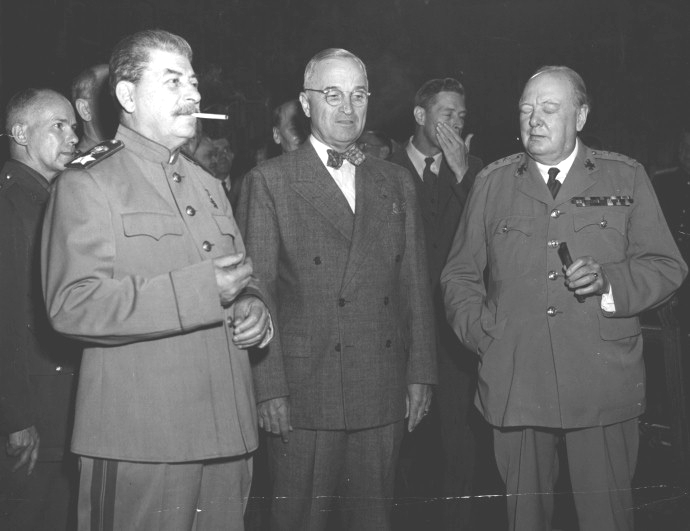 The Potsdam
Conference
The Potsdam
Conference
The Harry S. Truman
Library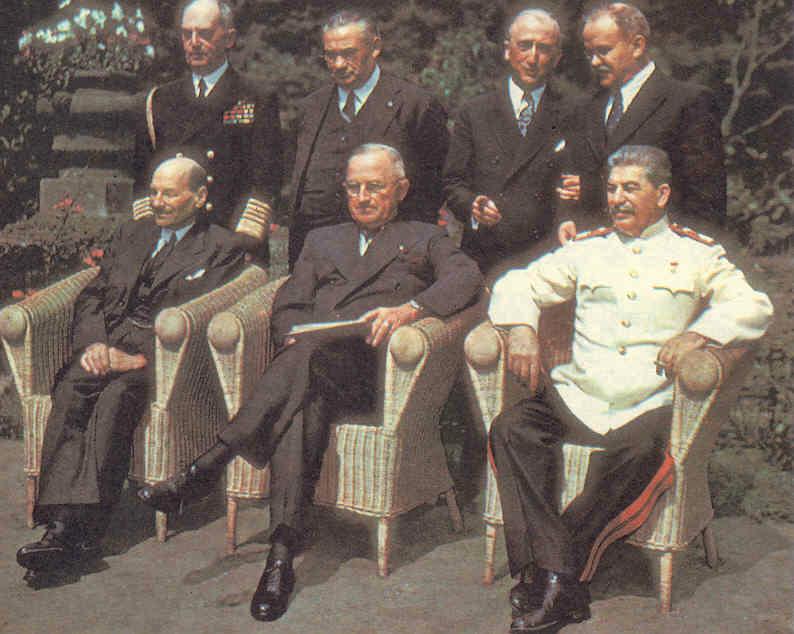
Clement R. Atlee,
Harry Truman
and Stalin at Potsdam – July 1945. Behind them are Adm.
William D. Leahy, Ernest Bevin, James F. Byrnes and Vyacheslav
Molotov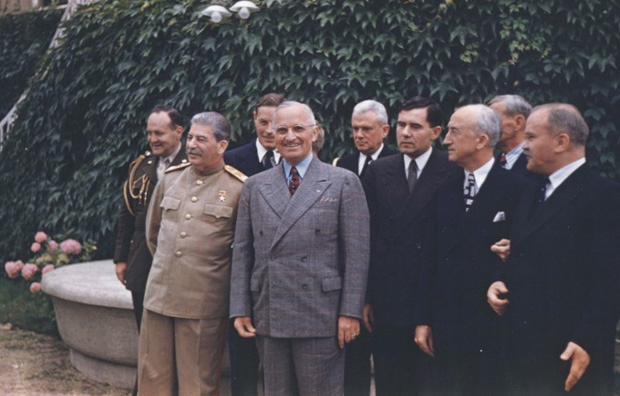 A picture of a
conference
session including Clement Attlee, Ernest Bevin, Vyacheslav Mikhailovich Molotov, Joseph Stalin, William D.
Leahy, Joseph E. Davies, James F. Byrnes, and Harry S. Truman
A picture of a
conference
session including Clement Attlee, Ernest Bevin, Vyacheslav Mikhailovich Molotov, Joseph Stalin, William D.
Leahy, Joseph E. Davies, James F. Byrnes, and Harry S. Truman
THE KNOCK-OUT BLOW THAT FINALLY BROUGHT JAPAN TO
ITS KNEES IN SURRENDER: THE ATOMIC BOMB |
|
After warnings about "utter destruction" sent by
the Allies to the Japanese emperor were ignored, on August 6th an
atomic bomb was dropped over Hiroshima, killing an estimated 100,000 to
150,000 soldiers and civilians (half that number on the first day, the
rest through burns and radiation poisoning over the next weeks).
Another warning was sent, this time directly by Truman to the Japanese
Emperor, but was not answered and thus on August 9th a second atomic
bomb was dropped, this time over Nagasaki, killing an estimated 40,000
to 80,000 Japanese.
With the bombing of Hiroshima, sensing
the war would likely be over very soon, Stalin declared war on Japan.
He did not want to be left out in the sharing of the goodies to be
picked up from a defeated Japan.
And indeed the war was soon over. Only one week later, on August 15th
the Japanese announced their unconditional surrender to the Allies. And
on September 2nd representatives of the Imperial Government met aboard
the U.S. Battleship Missouri to sign the instruments of Japanese
surrender
|
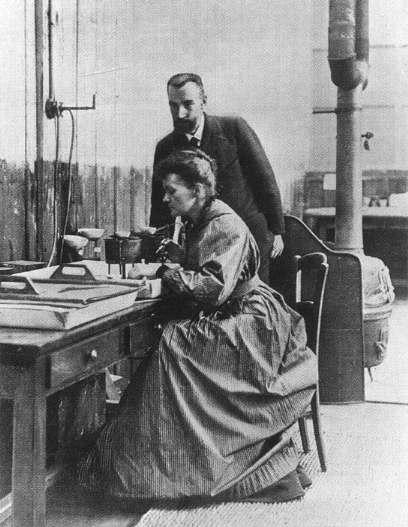 Pierre and Marie
Curie –
co-discoverers of the radioactivity of uranium –
1898
Pierre and Marie
Curie –
co-discoverers of the radioactivity of uranium –
1898
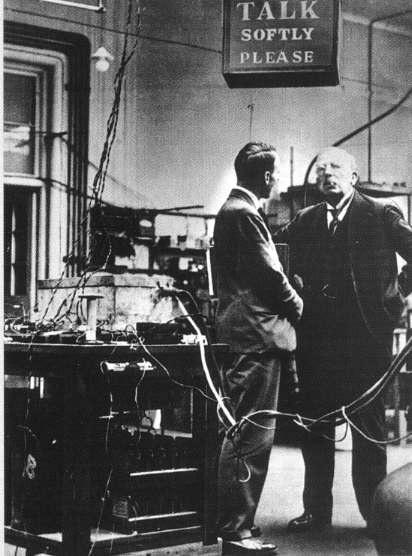 Ernest
Rutherford in his
Cambridge University lab where he first split the
atom
Ernest
Rutherford in his
Cambridge University lab where he first split the
atom
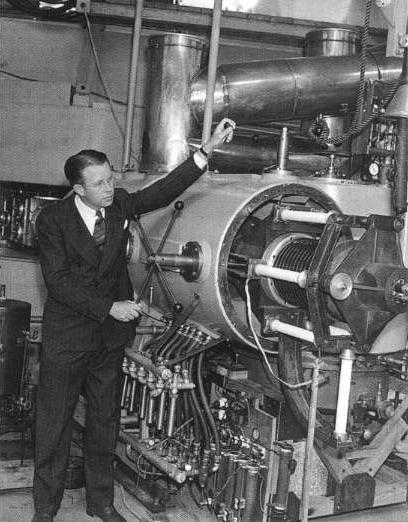 American Ernest
Lawrence
with his cyclotron particle accelerator
American Ernest
Lawrence
with his cyclotron particle accelerator
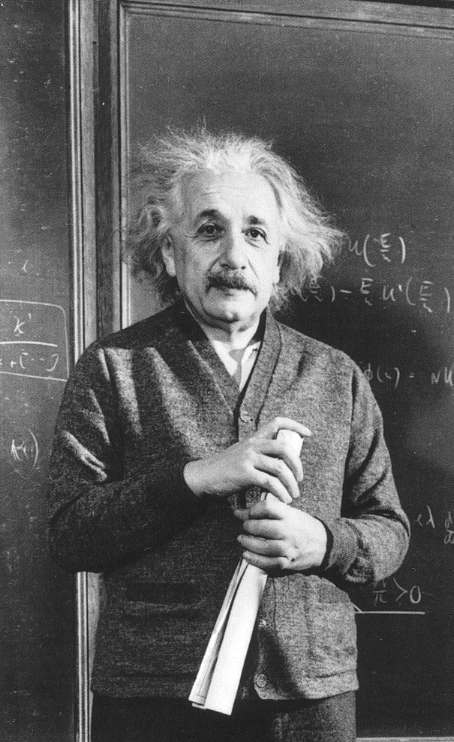
Albert Einstein –
1938
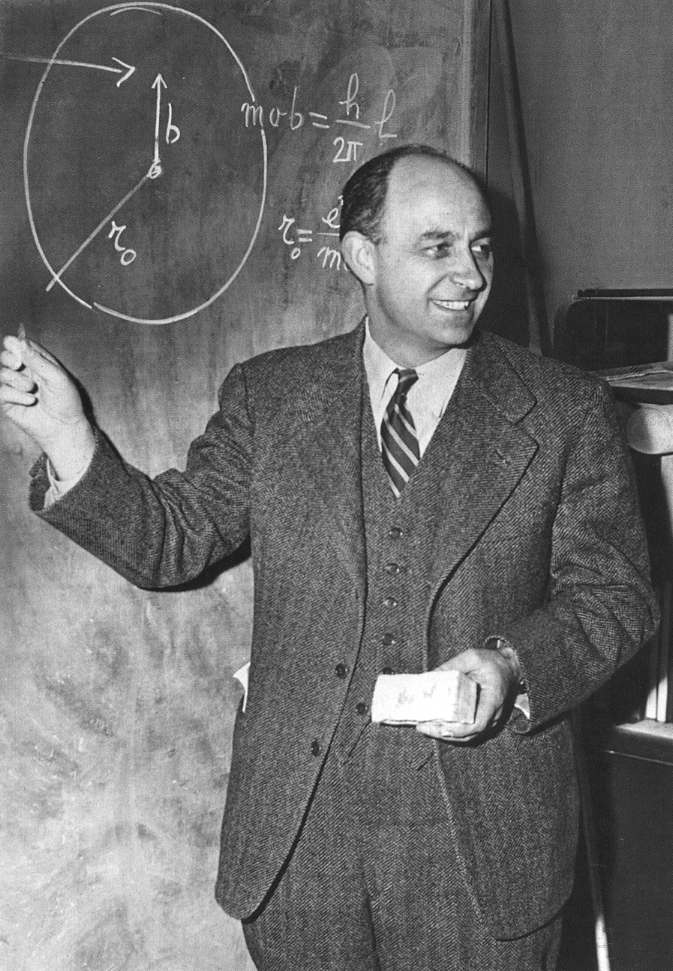
Italian emigré Enrico Fermi
- 1938
| He built a nuclear
reactor under the University
of Chicago football stadium and on December 2, 1942
achieved a sustained chain reaction –
giving material proof of his theory of nuclear fission
which had won him the Nobel Prize for
physics in 1938 and which paved the way for the creation
of the nuclear bomb. |
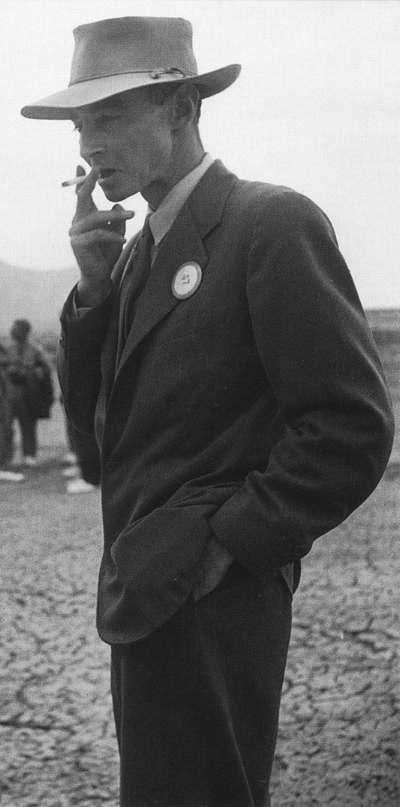
J. Robert Oppenheimer. He helped lead the
team that built the
American atomic bomb in the wilderness of New Mexico – first
tested successfully on July 16, 1945.
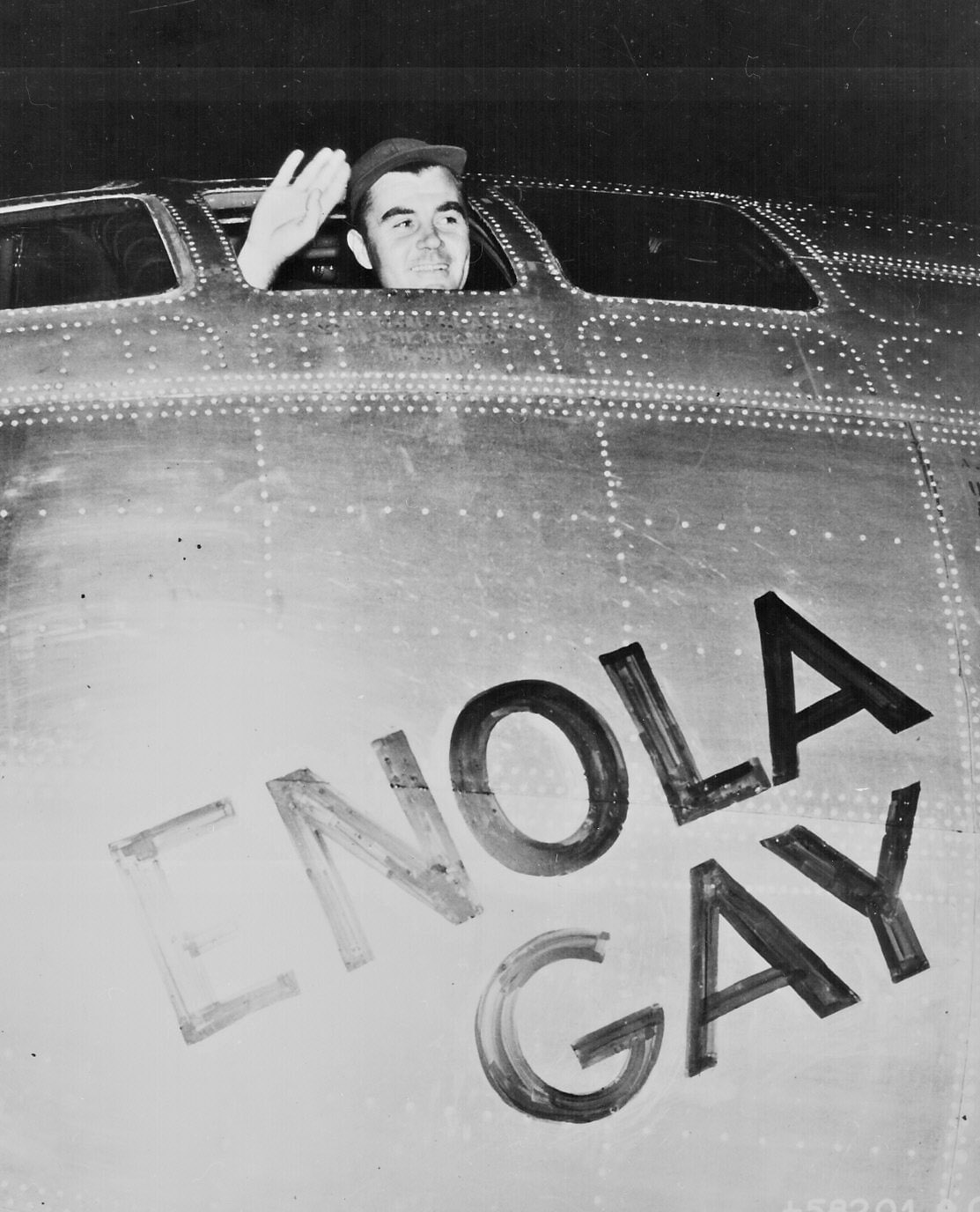
"Col. Paul W. Tibbets, Jr., pilot of
the ENOLA GAY, the plane that dropped the atomic bomb
on Hiroshima, waves from his cockpit before the takeoff,
6 August 1945."
National Archives
208-LU-13H-5.
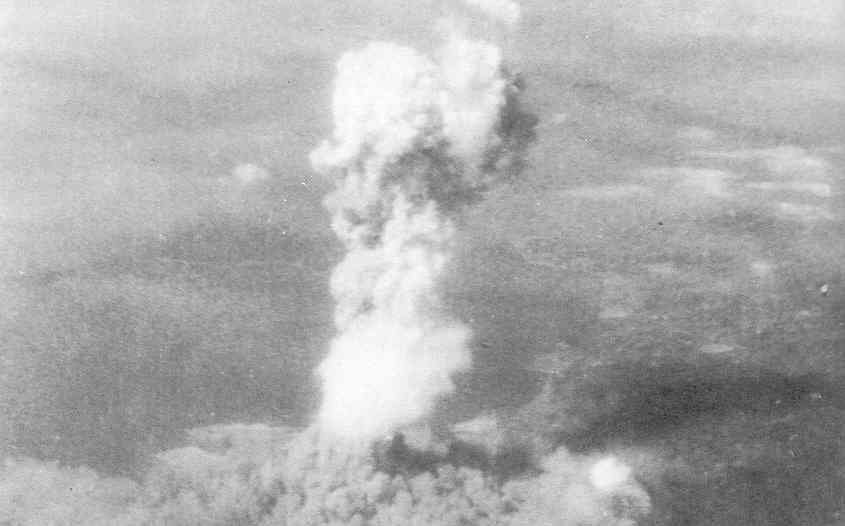
A-bomb over
Hiroshima – August
6, 1945
US Air Force
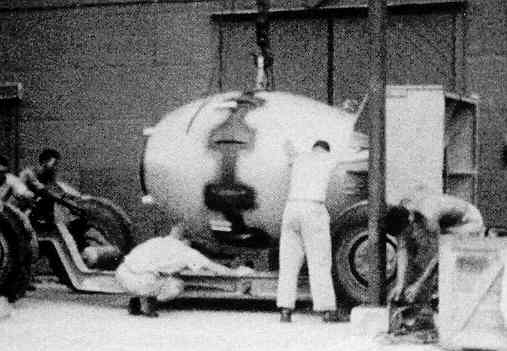 Plutonium bomb
"Fat Man"
being prepared for delivery against Nagasaki – early August
1945
Plutonium bomb
"Fat Man"
being prepared for delivery against Nagasaki – early August
1945
Corbis-Bettmann
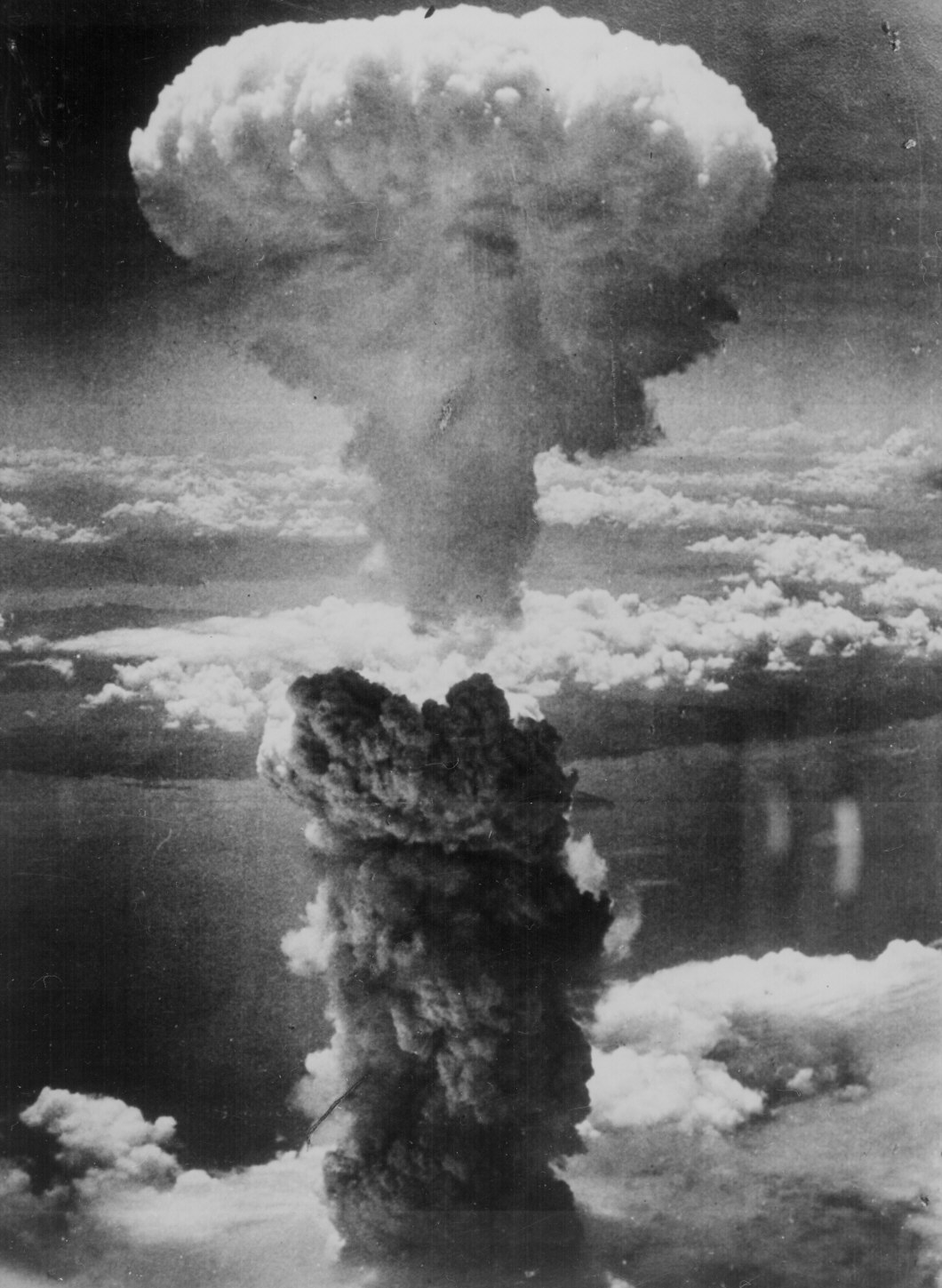
"A dense column of smoke rises more
than 60,000 feet into the air over the Japanese port of Nagasaki, the result of an atomic bomb, the second
ever used in warfare, dropped on the industrial center, August 8, 1945, from a U.S. B-29
Superfortress."
National Archives
208-N-43888
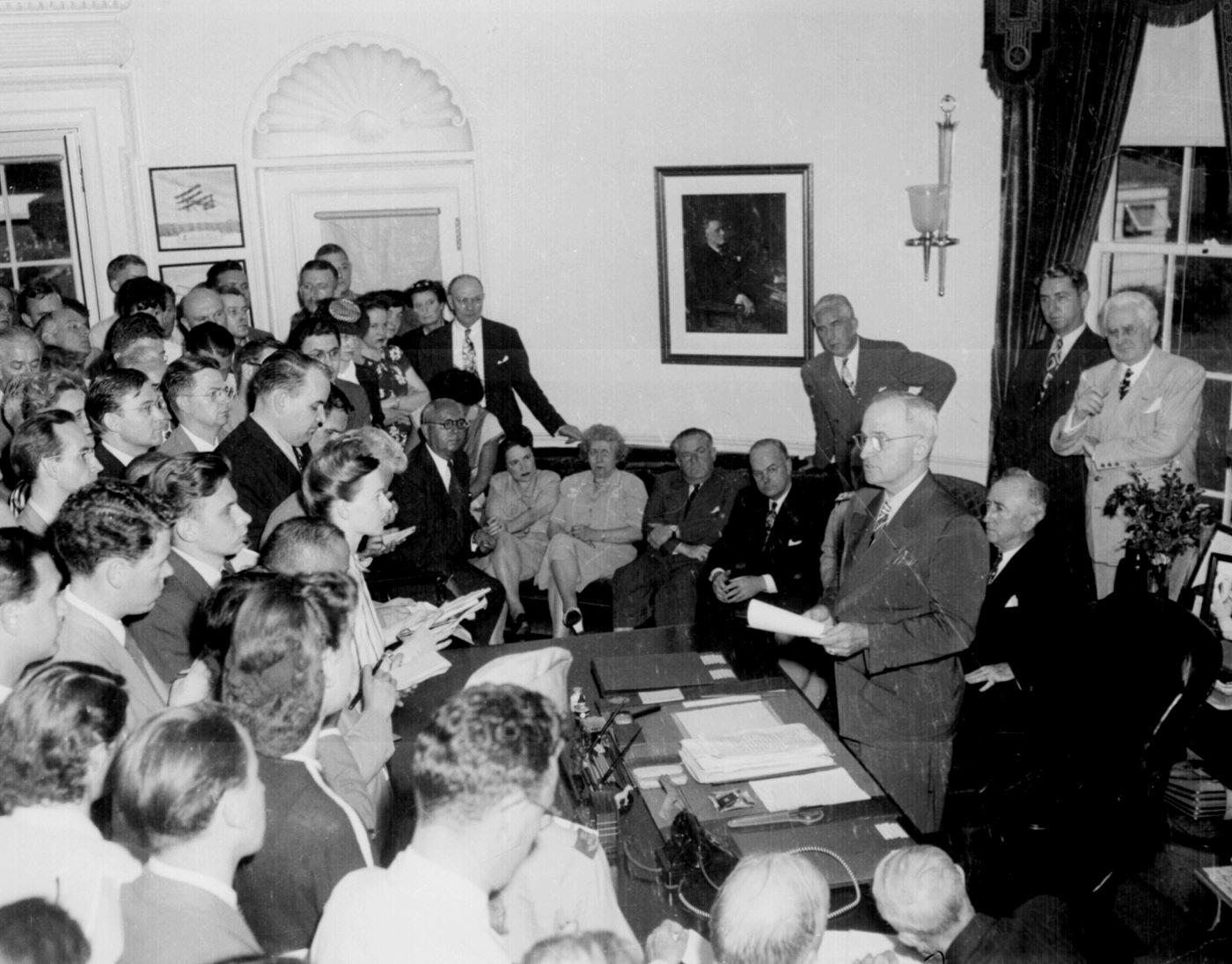
At
the White House, President
Truman announces Japan's surrender.
Abbie Rowe, Washington, DC, August
14, 1945.
National Archives
79-AR-508Q.
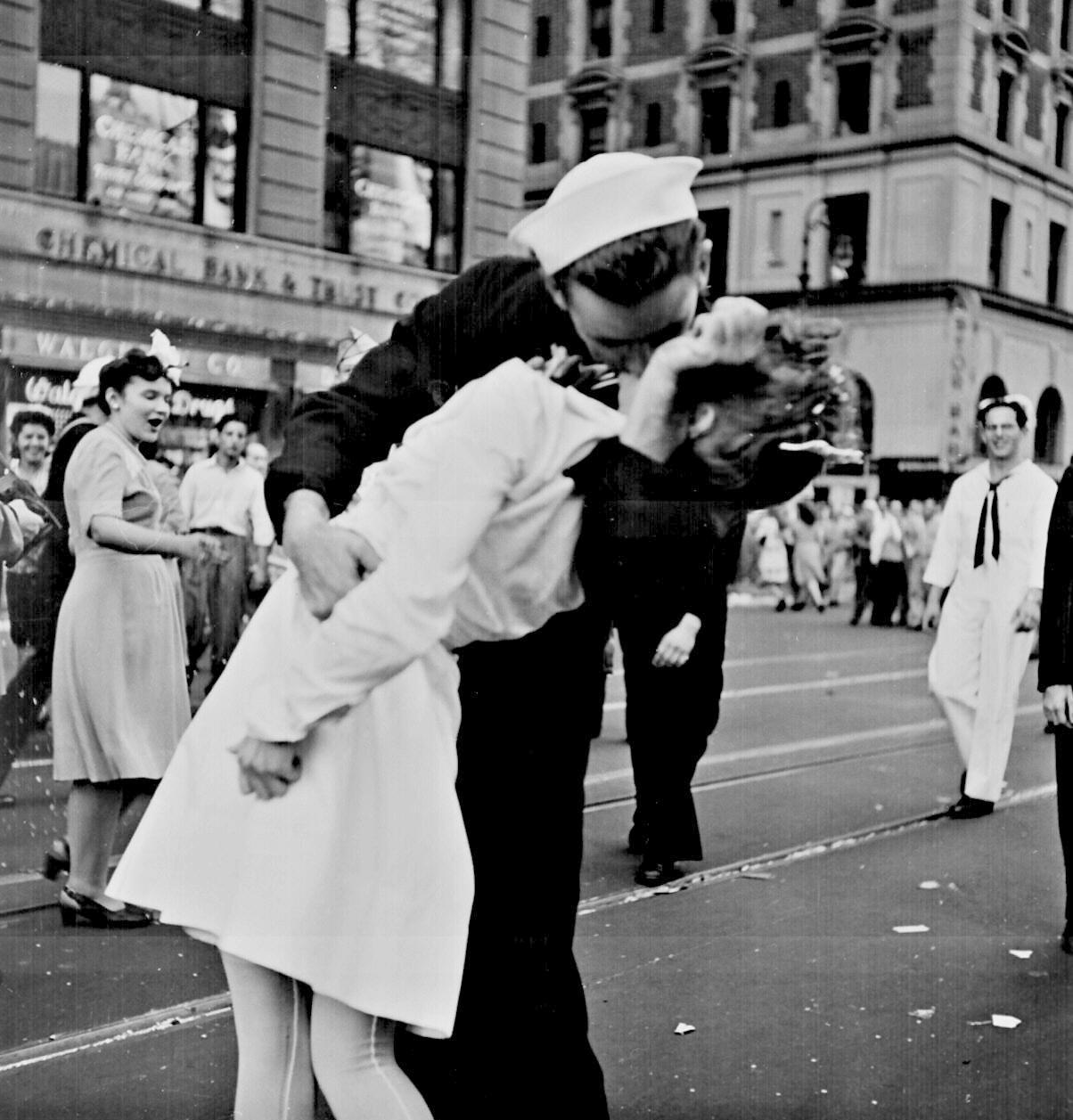
"New York City celebrating the surrender
of Japan. They threw anything and kissed anybody
in Times Square." Lt. Victor Jorgensen, August 14, 1945.
National Archives
80-G-377094.
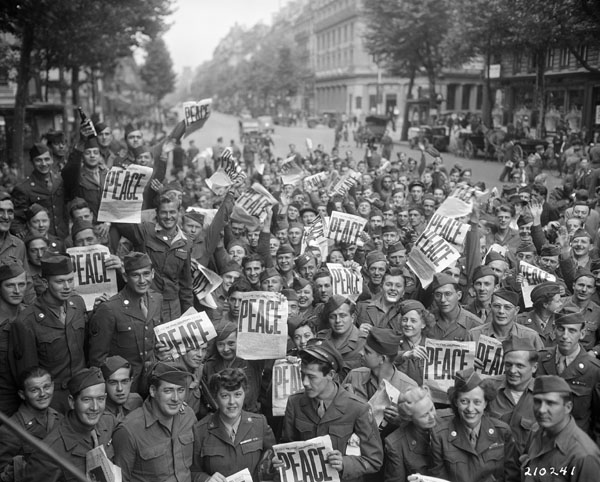 "American
servicemen and
women gather in front of 'Rainbow Corner' Red Cross club in Paris to celebrate
the unconditional surrender of the Japanese" By McNulty, August 15,
1945
"American
servicemen and
women gather in front of 'Rainbow Corner' Red Cross club in Paris to celebrate
the unconditional surrender of the Japanese" By McNulty, August 15,
1945
National Archives
111-SC-210241
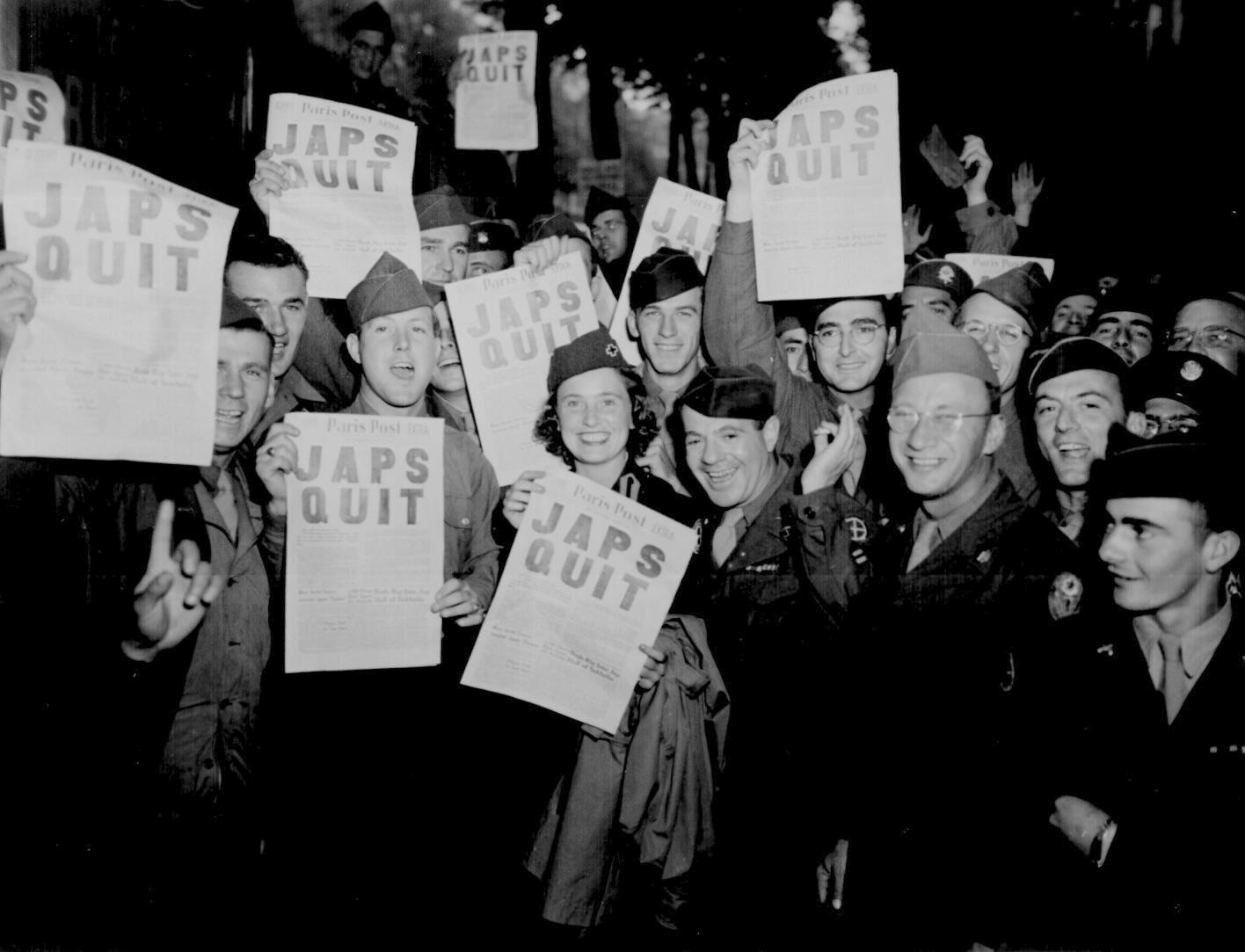
"GI's at the
Rainbow Corner Red Cross
Club in Paris, France, whoop it up after buying the special edition of
the Paris Post, which carried the banner headline, 'JAPS QUIT.' " T3c. G. Lempeotis, August
1945.
National Archives
111-SC-210208
JAPAN'S FORMAL SURRENDER ABOARD THE BATTLESHIP USS MISSOURI |
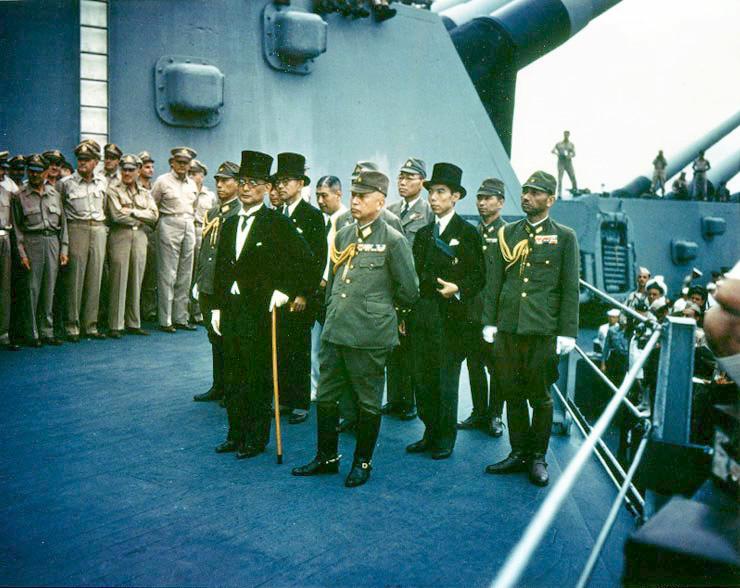
Japanese
delegation arrives
aboard USS Missouri to sign surrender -
September 2,1945
National Archives
NWDNS-111-SC-210626
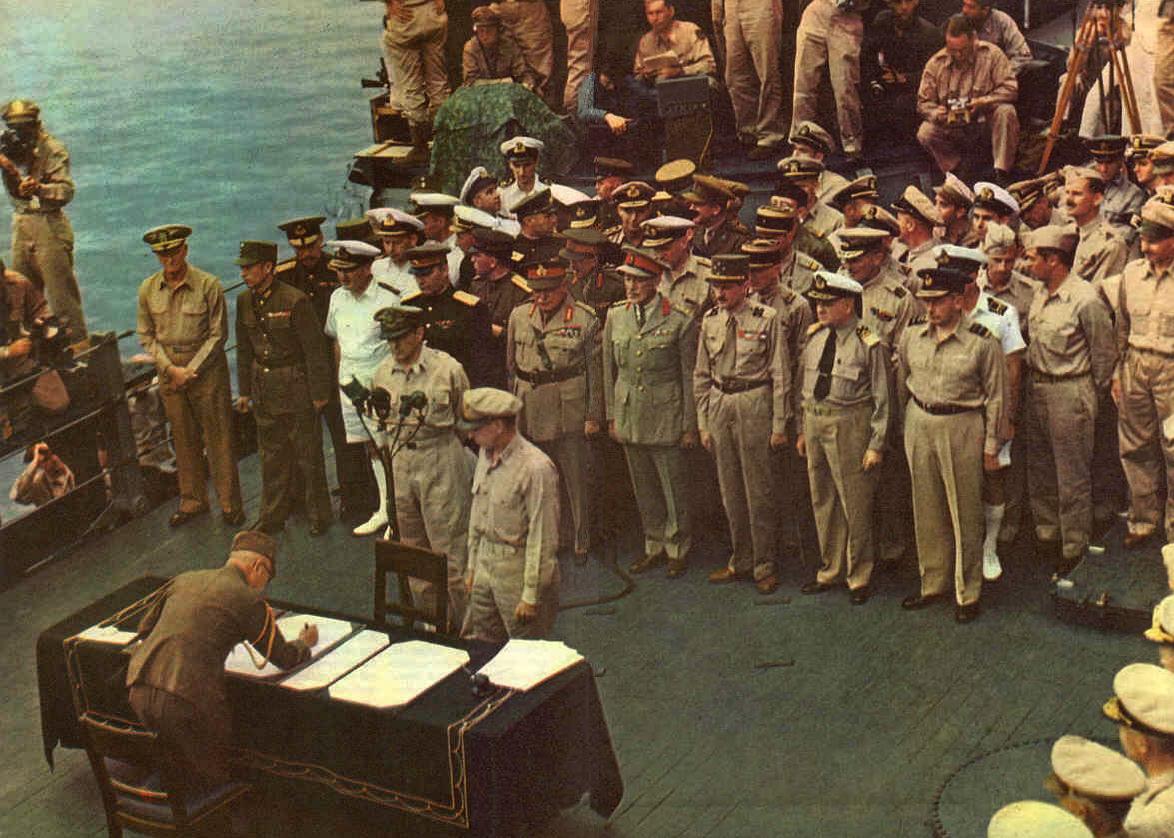
Gen. MacArthur (at microphone)
watches as Japanese Gen. Yoshijiro Umezu signs the surrender document aboard the battleship USS
Missouri
in Tokyo Bay on the morning of September 2, 1945
Department of the
Navy
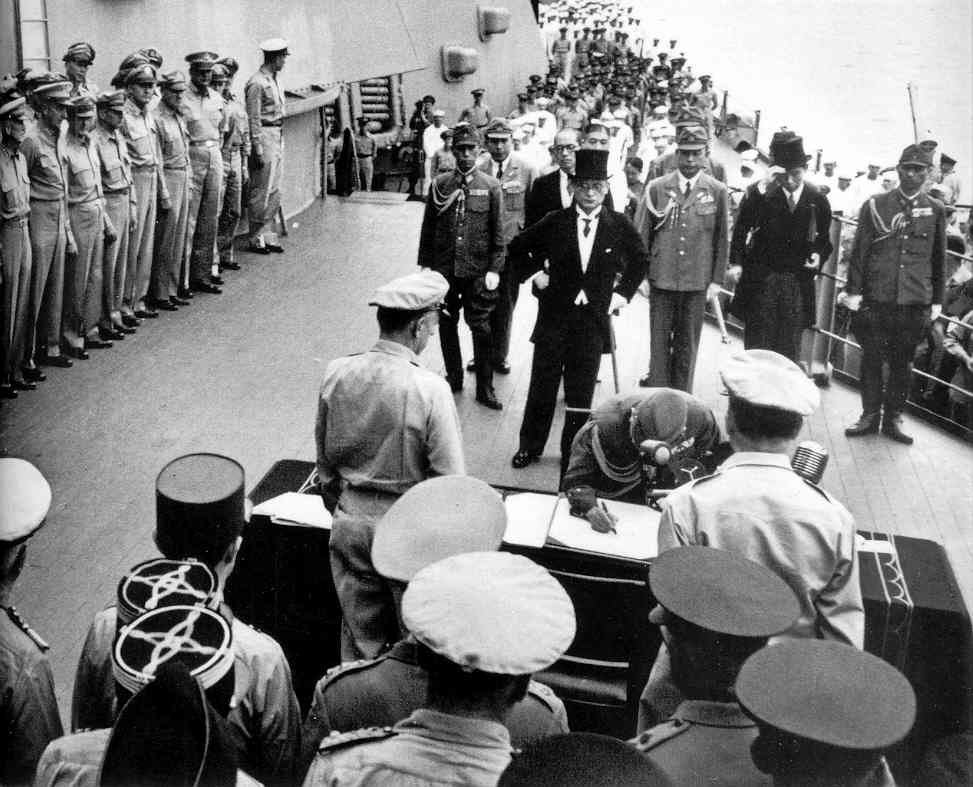
Japanese Gen. Umezu signs
surrender document as Foreign Minister Shigemitsu and other Japanese
watch
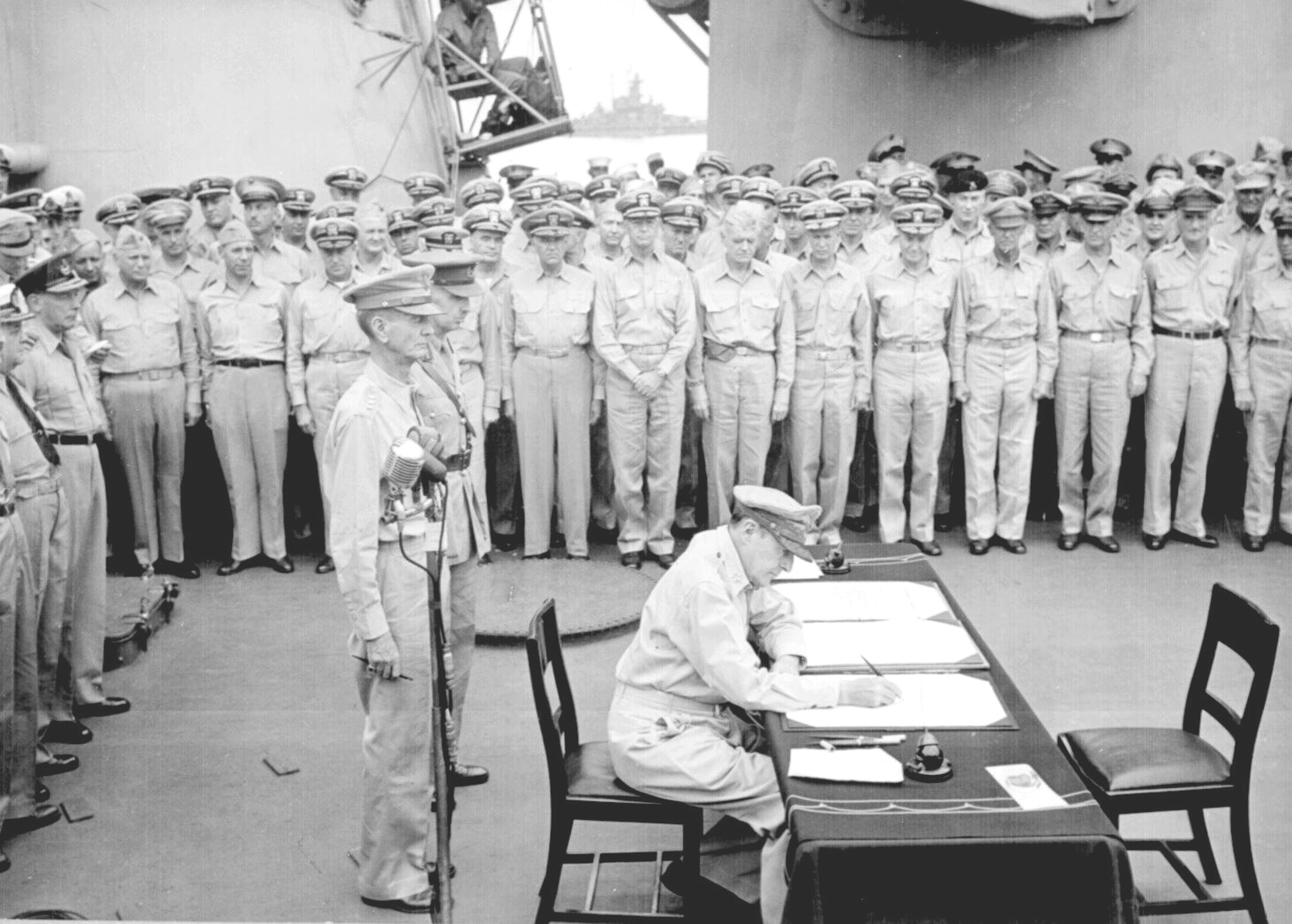
"Gen. Douglas MacArthur signs as Supreme
Allied Commander during formal surrender ceremonies on the USS MISSOURI
in Tokyo Bay. Behind Gen. MacArthur are Lt. Gen. Jonathan Wainwright and
Lt. Gen. A. E. Percival." Lt. C. F. Wheeler, September 2, 1945.
National Archives
80-G-348366.
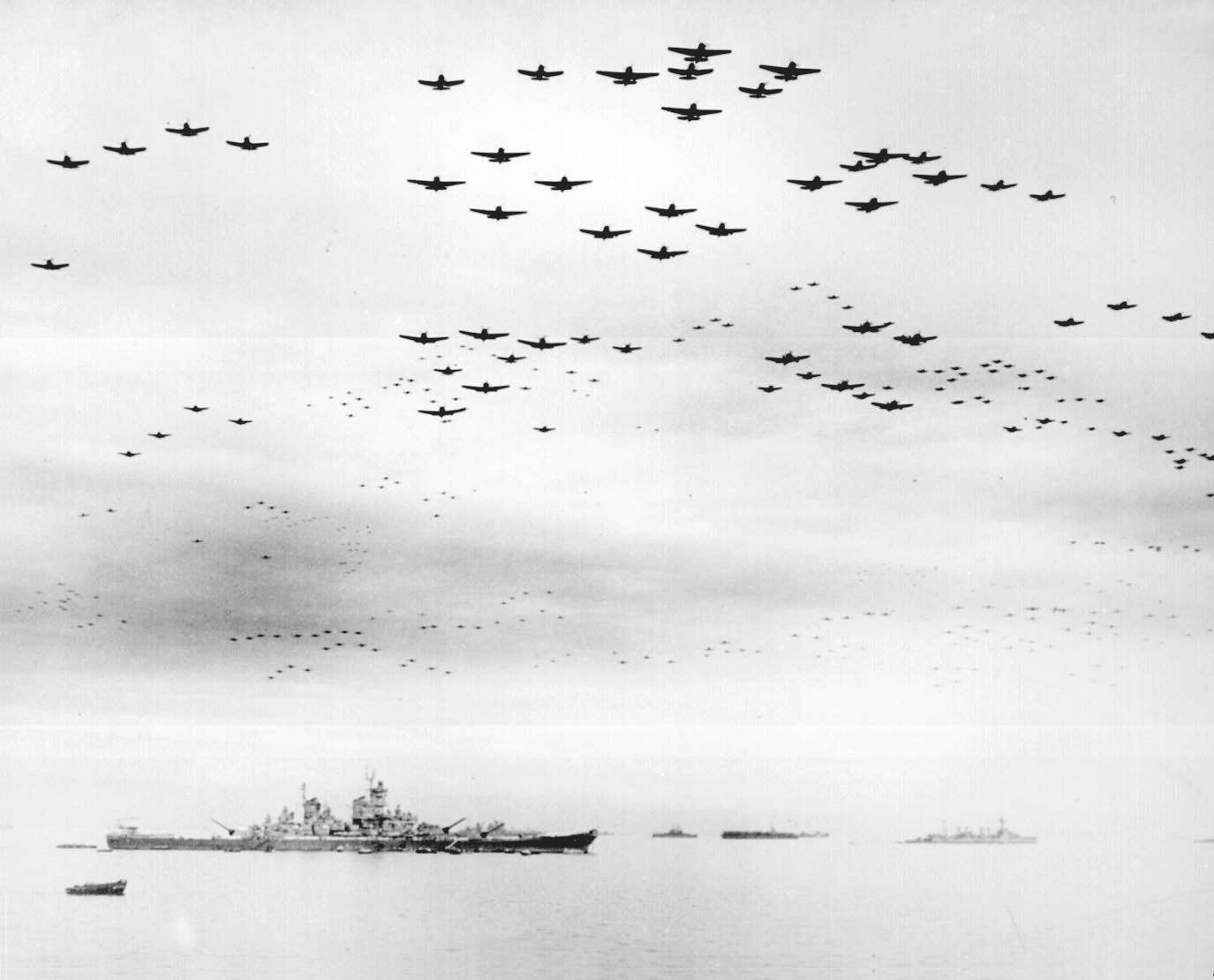
"F4U's and F6F's fly in formation
during surrender ceremonies; Tokyo, Japan. USS MISSOURI left foreground." September
2, 1945.
National Archives
80-G-421130.
| | | | | |


 Preparing for a post-war world
Preparing for a post-war world
 Roosevelt suddenly dies (April 12, 1945)
Roosevelt suddenly dies (April 12, 1945)
 The
final destruction of Hitler's German
The
final destruction of Hitler's German The war in Europe is finally over
The war in Europe is finally over
 Political considerations thrust
Political considerations thrust The Potsdam Conference – July 1945
The Potsdam Conference – July 1945
 Japan's formal surrender – September 2,
Japan's formal surrender – September 2,




















































